
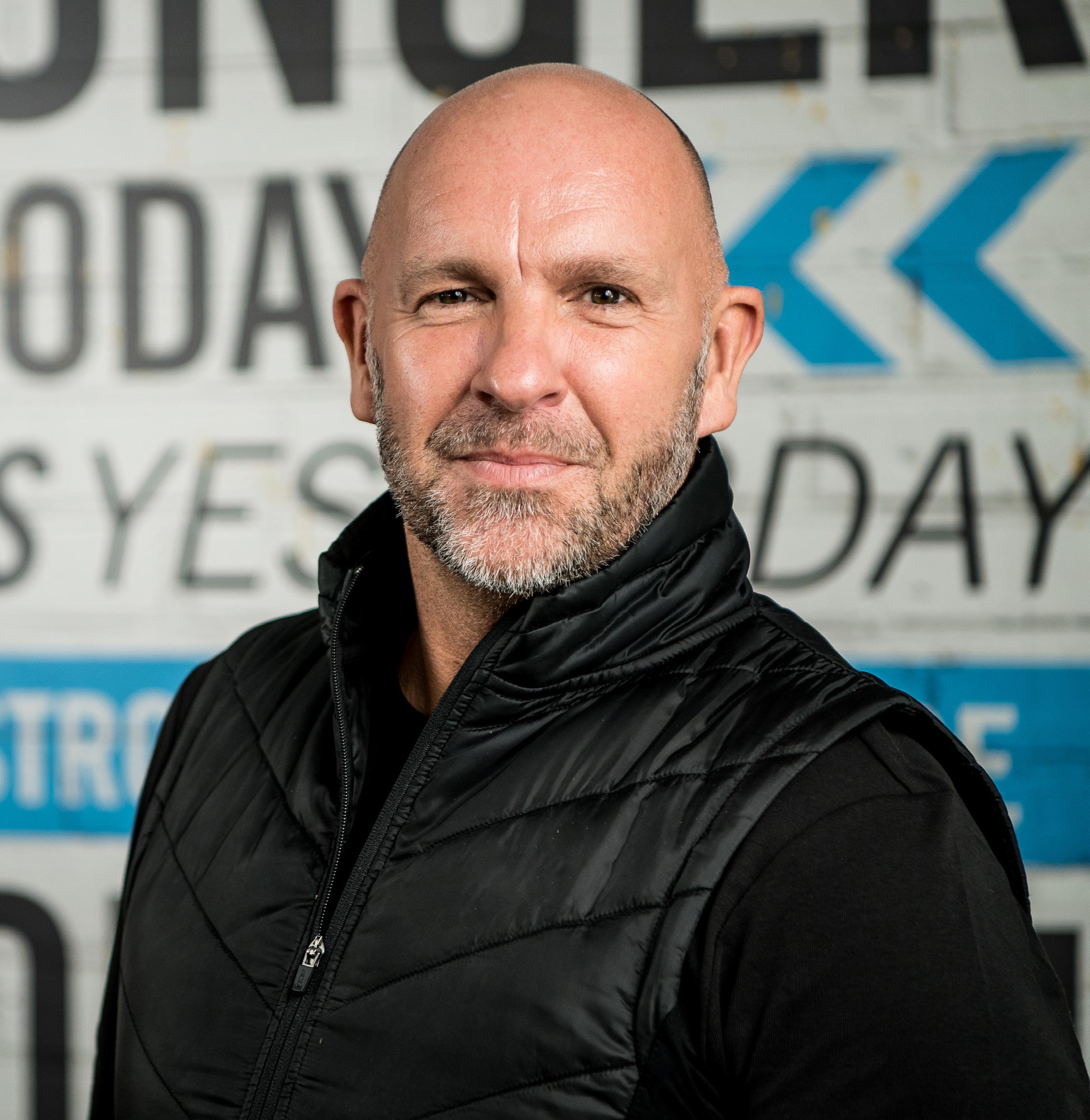

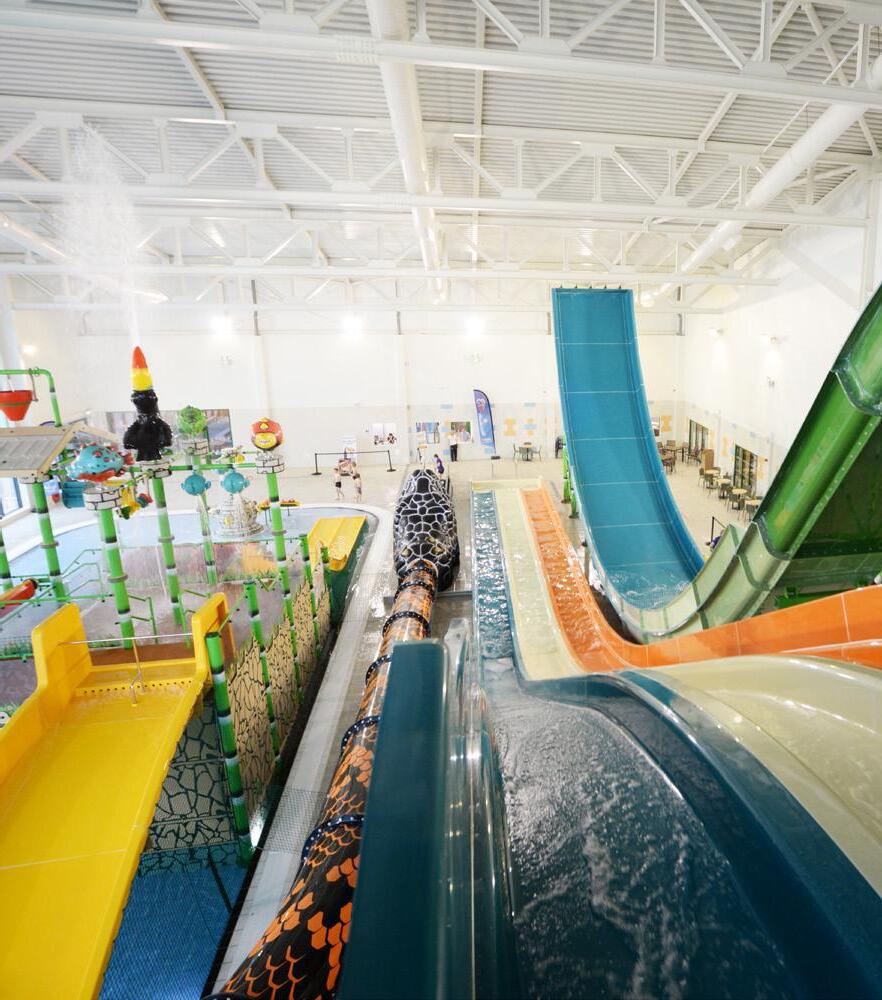












Physical activity and grassroots sport across the UK is set to benefit from more than £400m in funding, as part of the government’s Plan for Change.
Designed to deliver facilities that will “inspire people of all ages to get active”, the £400m will be invested in new and upgraded facilities in communities across the country.
The funding commitment, which was outlined in the Spending Review last week, has now been set out by Culture Secretary Lisa Nandy.
It is part of a larger, £900m investment in sport, which will also see more than £500 million committed to supporting the delivery of a host of world class sporting events being held in the UK over the coming years.
According to Nandy, the strategic investment in facilities and major events has been designed to “reduce
barriers to opportunity, bring communities together through shared national moments and showcase the best of the UK to the world”.
The investment has been welcomed by industry leaders.
Huw Edwards, CEO of ukactive, added: “With this level of investment, the Government has a unique opportunity to help shift the dial on the nation’s physical activity levels and significantly improve the nation’s health, but it must ensure it is targeted in the right areas.
“It must avoid repeating the mistakes made by previous governments and work with the sport and physical activity sector to channel funding into facilities and programmes. We’re ready to work with the government to co-design a strategy that sees our sector maximise this investment.”

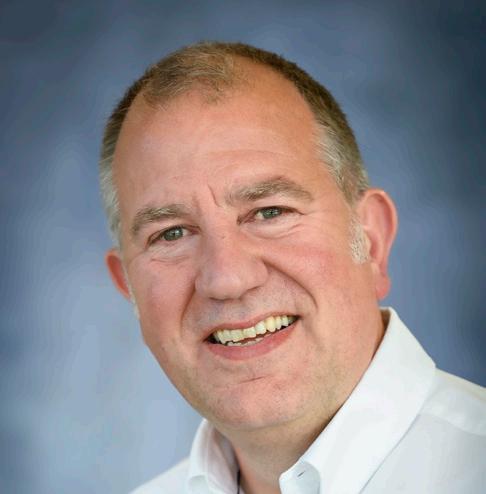

The government’s 10-year plan for the NHS, published on 3 July, will focus on prevention, embrace technology and drive a shift from hospitals to community health hubs.
Launching the plan – in the form of a 165page document – Prime Minister Keir Starmer said NHS England would move “from being only a sickness service to a health service which is genuinely preventative”.
While this should be great news for the physical activity sector, which has for years campaigned for a bigger role in providing preventative health measures through exercise, the plan seems to focus on a number of other forms of prevention. These include screening and early diagnosis and vaccinations.
Even on lifestyle-based measures, the emphasis seems to be on areas such as pharmacy-based weightloss services, measures to make supermarket foods healthier and highlighting the dangers of alcohol.
In its preamble, the new plan outlines three “big shifts” to how the NHS works:
● From hospital to community: more care will be available on people’s doorsteps and in their homes
● From analogue to digital: new technology will
The 10 points for prevention:
● Deliver on the Tobacco and Vapes Bill, which will mean that children turning 16 or younger can never legally be sold tobacco
● Launch a moonshot to end the obesity epidemic by restricting junk food advertising targeted at children.
● Restore the value of Healthy Start from the 2026 to 2027 financial year, expand free school meals and update school food standards
● Harness recent breakthroughs in weight loss medication and expand
liberate staff from admin and allow people to manage their care as easily as they bank or shop online
● From sickness to prevention: the aim is to reach patients earlier and make the healthy choice the easy choice
When it comes to prevention, the 10-year outlines a plan to “halve the gap in healthy life expectancy” between the richest and poorest regions, while increasing it for everyone and to “raise the healthiest generation of children ever”. The plan reads: “We will achieve our goals by harnessing a huge crosssocietal energy on prevention. We will work with businesses, employers, investors, local authorities and mayors to create a healthier country together.”
On prevention, the plan presents 10 main action points. Only one of these references physical activity. Somewhat bizarrely, it specifically identifies the Great Run Company as a “partner”, expected to deliver a campaign to motivate millions to run more on a regular basis. Even on weight-loss, the emphasis is on drugs.
The industry’s response to the 10-year plan could perhaps be described as lukewarm.
Huw Edwards, CEO of ukactive, said that if the government really wants to use prevention to save the NHS, the physical activity sector must play a key part.
access through the NHS. Negotiate new partnerships with industry to provide access to new treatments on a ‘pay for impact on health outcomes’ basis
● A new health reward scheme to incentivise healthier choices and working with the Great Run Company to motivate millions to move more on a regular basis
● Tackle harmful alcohol consumption by introducing new standards for alcohol labelling
● Join up support from across work, health and skills systems to help people find and stay in work. The
plan is to work with all integrated care boards (ICBs) to establish Health and Growth Accelerators models
● Expand mental health support teams in schools and colleges and provide additional support for children and young people’s mental health through Young Futures Hubs
● Increase uptake of human papillomavirus vaccinations among young people with the aim to eliminate cervical cancer by 2040
● Create a new genomics population health service, accessible to all, by the end of the decade.

“Prevention must be at the heart of our nation’s health strategy and there is collective hope that the 10-Year Plan, and the implementation plans that follow, will help create an NHS ‘fit for the future’,” Edwards said. “But for this plan to be successful where previous plans have failed, the government must lean on our nation’s network of gyms, pools and leisure centres to support people in all areas to be more active. The plan recognises the value of ‘getting millions more moving’ which is welcomed, but any campaign to drive this must involve the full breadth of the physical sector, especially ukactive’s members, who are the engine room behind the UK’s physical activity levels.
“Our sector already has a huge impact on the health and wellbeing of millions, with fitness activities and swimming shown as the biggest drivers of physical activity other than walking, but demand is growing and there is an urgent need to reach more communities. The government has an opportunity through the ‘neighbourhood health service’ to integrate physical activity into the deprived areas where inequalities are highest. We need to see clear plans to help incentivise more people to be active and for the full integration of health and fitness services into care pathways, including scaling proven programmes such as MSK hubs and Prehab4Cancer.
“In the case of weight-loss medications, it is essential the government works with our sector on the required wraparound support to ensure people achieve sustainable results and avoid potential health complications. We will work with the government and ensure all areas for our sector’s support and investment are addressed.”
Tara Dillon, CEO of CIMSPA, responded to the plan by highlighting how the sector’s workforce was “ready and able” to do its part.
“We welcome the NHS’s new 10-year plan and its ambition to shift focus towards prevention, early intervention and community-based support,” Dillon said.
“The sport and physical activity workforce has a vital role to play in that shift, not just in supporting recovery, but in preventing long-term health conditions before they develop. Professionally recognised practitioners are already making a real difference to health care provision. Take the recent research that has showed that following a structured exercise programme can reduce the risk of death by up to one-third in people with cancer. Whether it’s working with individuals living with diabetes, heart disease or mental health conditions, having a trusted, competent physical activity workforce, backed by professional status, is giving NHS professionals and service providers the confidence to partner with our sector like never before.
“By embedding physical activity professionals into prevention and recovery pathways, we can unlock huge savings while improving health outcomes and people’s lives at scale. Professional status is not just a badge, it’s a signal of quality, expertise and consistency and ensures that every individual engaging with our sector, especially those with complex conditions, is supported by a workforce that meets the highest professional standards.
“This new plan represents a major opportunity. We can help bring lasting change to the health of the nation.”
Low cost gym operator, NRG GYM, has partnered with digital health provider, HealthHero, to provide members with access to a range of online health services.
NRG GYM members and their families will be able to access GP services on-demand, with experienced clinicians available for diagnosis, advice and treatment. Members can also access physiotherapists and mental health practitioners, as part of NRG’s new Premium membership option.
With seven gyms in cities including London, Manchester, Newcastle and Sheffield, NRG GYM has more than 30,000 members across the UK.
NRG is also set to open its eighth gym and first facility in Scotland, with the launch of NRG GYM Glasgow this summer.
NRG GYM Founder and CEO, Shafiq Ahmed, said: “At NRG, we’re committed to being more than just a place to train – we’re building game-changing gyms that deliver real value to our members

NRG GYM has more than 30,000 members across the UK
and wider communities.
“That’s why I’m proud to announce our partnership with HealthHero – making us the first HVLP gym operator to offer this level of holistic health support.
“Through this partnership, we’re helping our members – and their
families – take control of their health far beyond the gym floor.
“With growing pressure on traditional healthcare services, we’re stepping up to deliver meaningful value, and provide our communities with solutions that support their wider health and wellbeing.”
Southend-on-Sea City Council has appointed Freedom Leisure as its new provider for leisure services. The management contract will see the leisure trust operate three leisure centres on behalf of the council – Belfairs Swim Centre, Shoeburyness Leisure Centre and Southend Leisure & Tennis Centre.
The three-year deal will also see improvement works being carried out across all three facilities.
Ivan Horsfall-Turner, Freedom Leisure CEO, says: “It’s an exciting time for Southend as we can now start to work towards delivering inclusive, accessible and efficient leisure services across the city.
“We look forward to working with the council, new colleagues, customers and stakeholders to evolve and improve Southend’s leisure offer and help residents to have healthy, active lifestyles.” The contract will see Freedom Leisure operate three facilities



BH Live will take over the management of sport and leisure services across Southampton from Monday 1 September 2025. Southampton City Council appointed the social enterprise to take over the contract following a tender process.
BH Live will now operate five venues and services on behalf of the council – The Quays Swimming and Diving Complex, Bitterne Leisure Centre, Chamberlayne Leisure Centre, and Outdoor Sports Centre – as well as manage bookings of the council’s sports pitches.
The facilities were previously operated by Active Nation, which ceased trading earlier this year, and are currently managed by Places Leisure.
Councillor Toqeer Kataria, Cabinet Member for Leisure, said: “We’re excited to begin this new partnership with BH Live, which shares our commitment to improving health outcomes and providing inclusive leisure services for all.
“This is a positive step forward for
the city, and we are confident BH Live will help us realise our long-term ambitions for physical activity, wellbeing and community engagement.”
According to Jon Workman, BH Live’s CEO, the organisation will work closely with the council, the existing operator and local stakeholders to ensure a “smooth transition of services” and continuity for both customers and staff.
BH Live will focus on digital improvements, community outreach, and increasing usage across all age groups and abilities. It will also support the council’s broader strategic goals, including tackling health inequalities, supporting local employment and reducing the city’s carbon footprint through green initiatives in facility operations.
Workman said: “At the core of this partnership is a shared belief: that regular movement and physical activity can make a powerful difference to people’s physical health and mental wellbeing.

The academy will provide individuals with recognised status
A new initiative between the Department for Work and Pensions (DWP) and CIMSPA – the professional body for the sport and physical activity sector – will help jobseekers find work and in turn help their communities to lead healthier, happier lives.
The two organisations have extended their partnership with a new initiative across four areas of the UK to help jobseekers start great careers in the sport and physical activity sector.
Through referrals from Jobcentre Plus local teams, jobseekers will be able to join DWP’s Sport and Physical Activity Employability Academy where they will receive dedicated pre-employment support and experience within the sector followed by the opportunity to gain an accredited, recognised qualification, and a guaranteed job interview.
The Employability Academy will also provide the individuals with sector recognised professional status which will boost their employability and enable them to take on roles which help more people in their community become physically active.
CIMSPA is working with its employer partners and its endorsed education providers that have met the highest level of quality assurance to enable the Sport and Physical Activity Employability Academy to provide experiences and learning that meets the sector’s employment needs.

Debra
Kayleigh Biggs has joined the SPATEX team as Head of Operations, bringing with her 15 years’ experience of working at the Coventry Building Society Arena, the home of the UK’s only dedicated water leisure show.
Held in early February, the show has expanded, attracting more companies than ever before from across the pool, spa and wellness space. Next year will be the 30-year anniversary of the event, showcasing the water leisure industry
Health and fitness qualification specialist, Study Active, has been acquired by three fitness education veterans – Debra Stuart, Carly Wallace and Julian Berriman.
The move marks a return to the sector for Stuart, a former Premier Global CEO and Executive Director of Active IQ. Stuart will take up the role of CEO at Study Active, while Berriman will become Director of Education and Wallace Managing Director.
Berriman – who spent 20 years at Premier Training, including as International Research and Development Director – is currently the Director of EuropeActive’s Professional Standards Committee.
In March 2024, Study Active acquired the Premier Global brand, a move designed to preserve and evolve the legacy of Premier as a leader in health and fitness education.
Stuart said the new ownership group is committed to “modernising training delivery, raising standards across the board and bridging the gap between qualifications and

real-world careers in fitness”, adding: “We are not just evolving the brand; we are reigniting a movement. This is about excellence, inclusion, and creating long-term impact for both learners and the industry as a whole.”
The move will see James Luscombe, founder of Study Active, transition into a shareholder role.
Luscombe said: “This is an exciting new era for Study Active. With Debra, Carly and Julian now leading the charge, we’re perfectly placed to drive innovation and raise the bar for fitness education in the UK.”
alongside an education programme for pool and spa professionals.
Show Organiser, Michele Bridle, says: “It’s an incredibly exciting time at SPATEX as we celebrate three decades. We are excited to unveil our eye-catching 30th anniversary design. It’s a history we’re proud of. We’ve established ourselves as the UK’s only dedicated, showcase of the industry.
“We toast the past, but we look to the future as we grow”
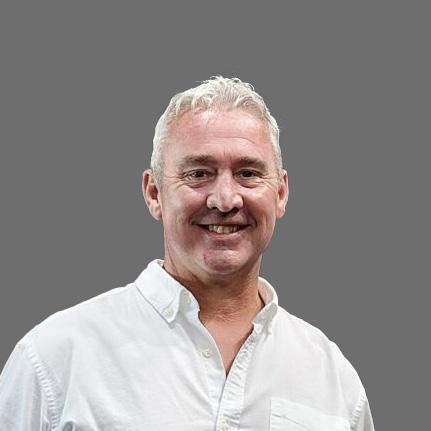
VYZR Group appoints Ivan Stevenson as Partnerships Director
VYZR Group, a fitness marketing and tech startup, has appointed leisure industry expert, Ivan Stevenson, as a Non-Executive Director.
In his role, Stevenson – who has helped scale a number of leisure organisations – has been tasked with championing VYZR’s growth and partnerships. He brings more than two decades of senior leadership experience within the leisure and culture sector across business development and strategic planning.
Leisure DB’s Monthly Market Tracker lets you quickly identify and respond to new opportunities in the market and on your doorstep.
Each month, we round up key developments in the UK gym market: openings and closures, planning updates, proposed expansions, rebrands, management changes and more.
Keep your finger on the pulse and your business one step ahead.
Find out more and download a free sample report: leisuredb.com/market-tracker
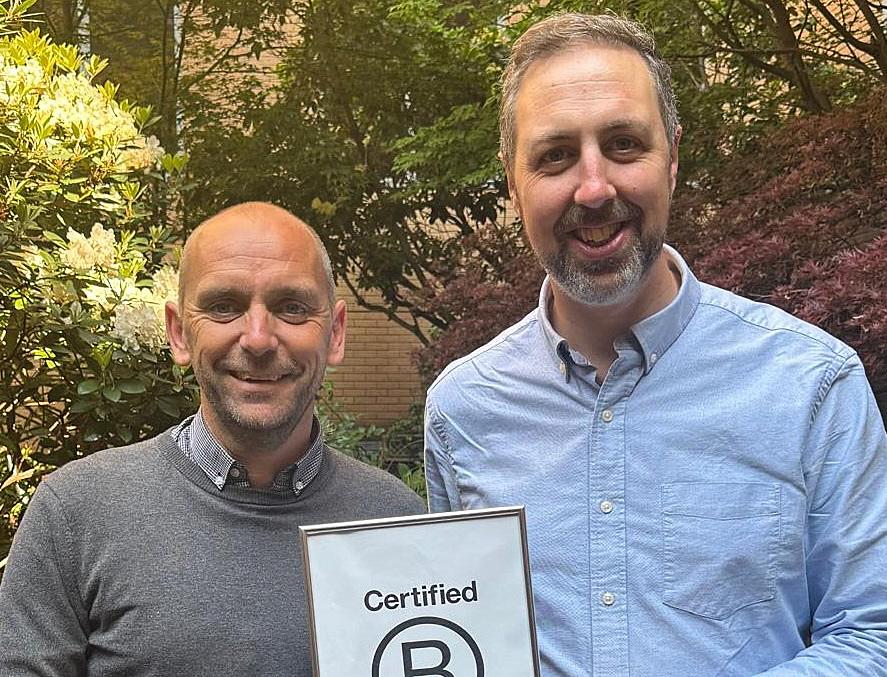
Bigwave Marketing, a UK-based agency specialising in leisure and culture sector marketing, has announced its certification as a B Corporation (or B Corp).
Bigwave joins 2,500 fellow B Corps in the UK and a growing set of 9,700 businesses worldwide. Verified by B Lab, the not-for-profit behind the B Corp movement, the certification process is rigorous, requiring companies to demonstrate their positive impact on society and environment through comprehensive assessment.
Innovatise, the creators of the fitness member platform MyFit App, has announced a strategic partnership with conversational AI provider HireBob.ai, in what they have said is a major step forward in how fitness operators engage with their members.
This integration embeds HireBob AI’s hyper-realistic, 24/7 conversational agents directly within the MyFit App platform, enabling gyms, health clubs, and leisure centres to deliver seamless, round-the-clock support and service to their members.

Dr
is already working with club operators in several other countries
Indian fitness entrepreneur, Dr. Samir Kapoor, has set his sights on the UK, launching Make Your Gym (MYG) to the UK market. Launching at Elevate, MYG is the product of Kapoor’s 10 years’ experience scaling Multifit, a chain of 37 gyms operating in three countries.
MYG aims to provide operators with a complete solution that takes their training environment ambition and turns it into an effective, sustainable reality.
“Having built and operated a multi-site gym brand, I’ve learned first-hand that success isn’t just about equipment,” Kapoor said. “It’s about creating a complete ecosystem that works commercially, operationally, and experientially. That’s the gap MYG fills.”
MYG offers a full-service, strategic partnership supporting gym owners with project delivery, from tailored design solutions and business planning to customer profiling, space optimisation, programming and instructor education. In a
departure from the industry norm, MYG manufactures its own brand equipment in India, an intentional move to “avoid mass-produced imports and strengthen supply chain transparency”.
According to Kapoor, the recent UK–India Free Trade Agreement, soon to come into effect, makes this decision even more relevant. He says: “India offers agility, quality and innovation. Now, with the Free Trade Agreement, it’s a viable, long-term manufacturing hub for the UK. Through our international partnership we are creating jobs and innovation in India while delivering precision-built, highquality solutions to the UK. That’s what shared global growth looks like.
For us, ‘Made in India’ isn’t just a slogan. It’s a commitment to quality with local insight. We’re here to improve the global fitness infrastructure, one gym at a time.” MYG already has operator partners in India, UAE, Saudi Arabia, Kuwait and Germany.


People shouldn’t rely on fat loss drugs alone to fight the battle against obesity, according to leading GP and TV medic, Dr Hussain Al-Zubaidi.
Al-Zubaidi, a regular guest on Channel 4’s ‘Steph’s Packed Lunch’ and the lifestyle and physical activity lead for the Royal College of General Practitioners, was addressing a Bolton gathering of fitness industry professionals discussing the roll out of GLP-1 drugs.
“The roll out of GLP-1s within primary care is very much the hot topic at the moment,” Dr Al-Zubaidi said.
“It is going to transform how we deliver primary care – and a lot of other things. As we roll out GLP-1 therapies in primary care, we must resist the temptation to settle for the minimal scalable model of lifestyle support. I was emphasising that people deserve better than that.
“Our patients deserve a comprehensive, multi-component approach – nutrition, behavioural and psychological support, sleep and stress

management, physical activity, and addiction care all working in harmony.”
Dr Al-Zubaidi was the speaker at a professional development networking event for the health, fitness and wellbeing sector held at the Bolton Arena Community Sports Village. The network, known as LFX, is made of
over 40 leisure operators who meet regularly to share and evolve ideas.
The Bolton event was organised in conjunction with GM Active, a collective of 12 leisure and community organisations which manage publicly owned leisure and physical activity assets on behalf 10 local authorities.
EMD UK, the national governing body for group exercise, has launched a new free online educational resource hub designed to empower instructors to break down barriers and help more women become active through group exercise.
Called Reach Up and developed in collaboration with Sport England’s This Girl Can campaign, Reach Up addresses real-life barriers by equipping instructors with powerful, practical tools to create welcoming, inclusive environments where every woman feels she belongs.
With input from fitness professionals and sector experts, Reach Up provides guidance to help instructors connect with women who can benefit most from group exercise, giving them the motivation, confidence and support they need to get started and keep going.

Drive results, retention and revenue with the world’s most powerful training ecosystem, connecting over 200 leading brands across your entire gym floor.



EGYM’s open ecosystem provides club members with a smarter way to train
In an industry evolving at speed, agility is everything. Gym operators need solutions that integrate, adapt, and scale with their business, not systems that lock them in or box them out. That’s why EGYM’s open platform is the smart choice for operators.
EGYM powers the world’s largest open fitness platform, creating a connected ecosystem of over 200 integrated brands. Its unique digital solutions, apps, smart gym equipment, and corporate wellness program combine to deliver the industry’s most comprehensive training experience, one that puts every member at the centre of their own personal health and fitness journey.
An open platform for a connected industry EGYM’s open ecosystem is built for flexibility, performance, and freedom of choice. It empowers
operators to create a unique technology stack tailored to their business, selecting best-in-class tools across the fitness, wellness, and health landscape. Whether running a boutique studio or managing a multisite portfolio, EGYM offers solutions that flex to fit. From wearables and body composition tools to member management systems, fitness equipment, and recovery technologies, EGYM’s plug-and-play model brings together all components into a single solution. The result is a fully integrated, seamless experience that enhances every member interaction and streamlines operations.
Genius in action: AI-powered personalisation
At the heart of EGYM’s ecosystem is EGYM Genius, an AI-driven training guidance system that makes the entire gym floor smarter. Genius connects all
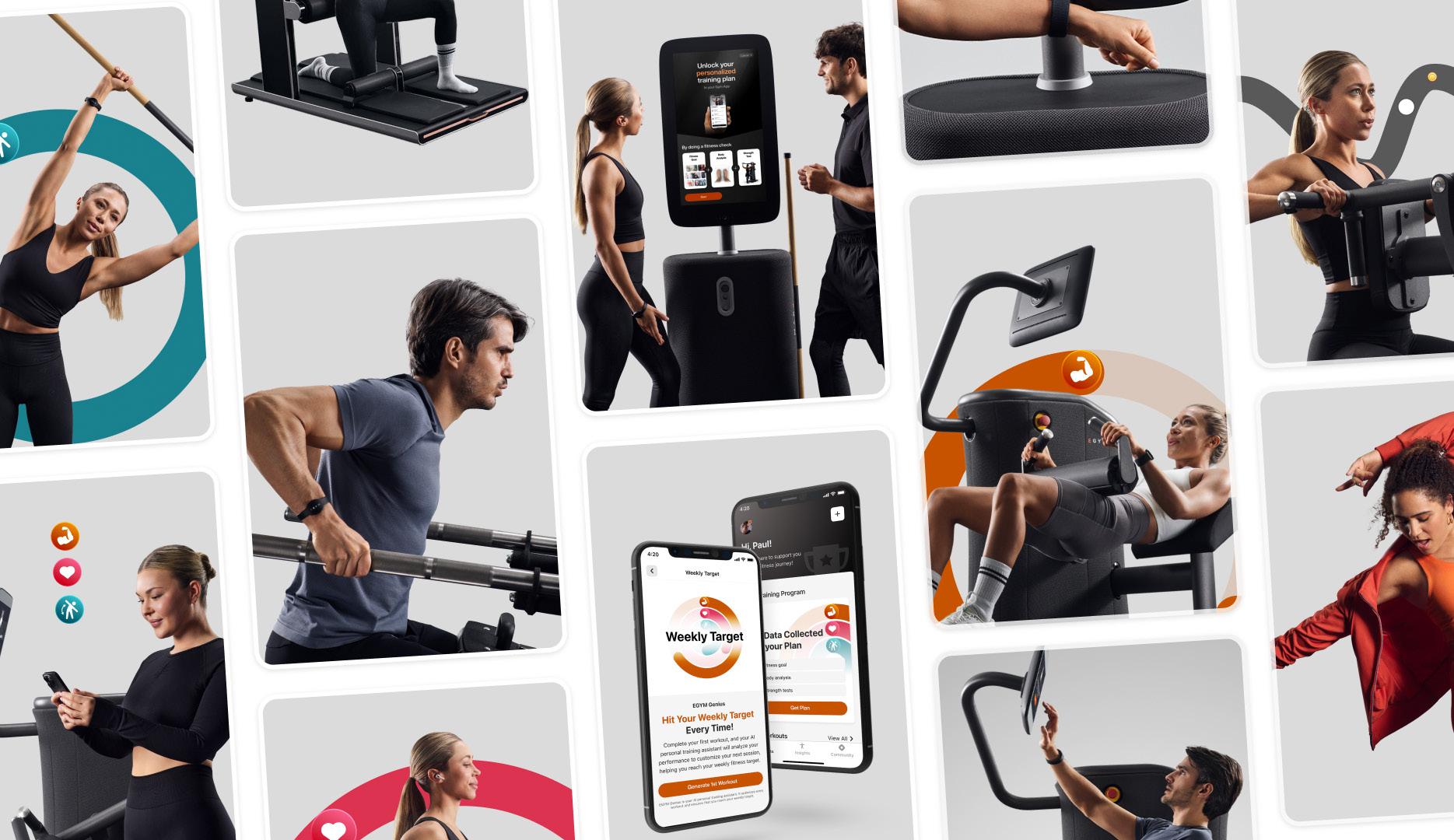

equipment, regardless of brand, creating hyperpersonalised, goal-focused workouts for every member.
And for operators, it’s just as smart. With the all-new EGYM Business Suite, operators can upload the complete equipment inventory of their facility, including both smart and analogue machines. Genius then draws on more than seven billion workout data points, 340 million assessment records, and over a decade of sports science expertise to generate adaptive training plans selecting from the equipment available.
Even third-party analogue equipment becomes ‘smart’ with Genius guiding members on form, weight, cadence, rest periods and periodisation. Every rep, every set, every workout becomes more effective. This helps members progress safely and confidently towards their goals.
The result is intelligent training that keeps members engaged for longer. EGYM users train more often and stay longer than non-EGYM members, and this improved retention has a direct impact on revenue.
Innovation through collaboration
EGYM’s inclusive approach to technology fuels innovation not just for EGYM, but for every partner in the ecosystem. By working with specialist providers across multiple sectors, EGYM’s platform evolves in line with the latest technologies, member behaviours, and scientific insights. This means members always have access to leadingedge tools and experiences while operators maintain relevance in a rapidly advancing, tech-rich environment.
Data that drives performance
EGYM’s open ecosystem not only connects equipment, it also connects data. Unified insights across training, recovery, engagement, and usage gives operators a 360-degree view of performance. Through real-time analytics and intuitive dashboards, operators can make fast, informed decisions that improve both member outcomes and business efficiency. From identifying underused equipment to identifying programmes that boost retention, EGYM transforms raw data into action and action into growth.
Built to evolve
As fitness technology advances, so do member expectations. EGYM’s open platform is designed to evolve with them. Its robust API infrastructure makes it easy to integrate new tools and emerging trends from hybrid training and biometric tracking to rehabilitation support and preventative health programmes.
This future-readiness allows facilities to serve a broader audience, from high-performance athletes to first-time health seekers, cementing their position as vital, inclusive wellness hubs within their communities.

To find out more about EGYM Genius, visit: https://uk.egym.com/en-gb/genius
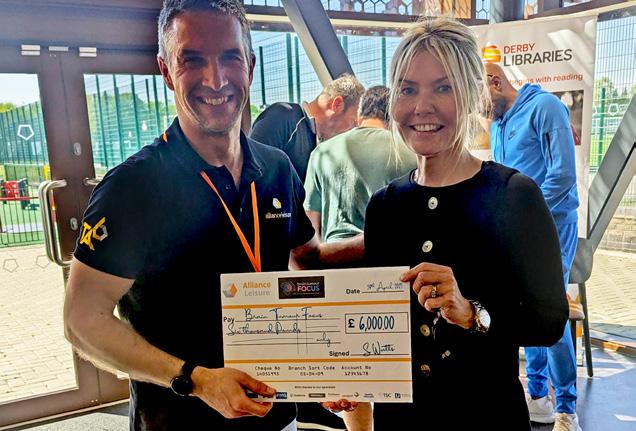
Alliance Leisure has helped to raise £6,000 for Brain Tumour Focus, a new charity established by fitness industry professional Mel Crossland following her brain tumour diagnosis. Alliance hosted its inaugural charity football tournament at Derby Racecourse Football Hub, which saw 16 teams from across the leisure and construction sector competing for the title of tournament champions.
Companies taking part in the day included CGP MEP, Curo Construction, Etec, FMG Consulting, Gladstone, Hadron, Hensall, Indigo Fitness, Pellikaan, Prospec, Roberts Limbrick, Speller Metcalfe, TG Escapes, The Sports Consultancy and Universal Group. The event was also supported by a host of sponsors, such as Prospec, The Sports Consultancy, Etec Group, Hensall, Universal Group, CGP MEP, Gladstone, Curo Construction, Speller Metcalfe and Pellikaan.
FMG Consulting were overall champions, with Alliance Leisure winning the “Europa Cup”. John Leaver, Marketing and Frameworks Director at Alliance Leisure, organised the tournament.
Leaver said: “We were blown away by the incredible support for the event and would like to thank everyone for their generosity. I’m so proud of the funds we’ve raised for Brain Tumour Focus.”

Plans have been submitted for a new Sports & Leisure Centre in Stevenage. The proposals outline the demolition of the existing Stevenage Swimming Centre and replacing it with a new centre housing a 25-metre, 10lane competition swimming pool with seating for 150 spectators, a teaching pool, splash pad and sauna and steamrooms. Other facilities include a six-court sports hall and a health club with a gym floor, fitness suite, multi-purpose studios and indoor cycling studio. There will also be a soft play area and a café.
Designed by FaulknerBrowns Architects, the centre will be owned by Stevenage Borough Council.
The council shared initial designs for the centre in late 2024, with a view of seeking feedback for the building.
If approved, the facility will bring together sports, leisure and swimming facilities under one roof, whereas they are currently provided at Stevenage Arts & Leisure Centre and Stevenage
Swimming Centre. The project will be partially funded through the Government’s Towns Fund. The Stevenage Development Board secured £37.5m in March 2021, and a proportion of this will be used for this new facility.
Adrian Hawkins OBE, Chair of the Stevenage Development Board, commented: “The proposed new Stevenage Sports & Leisure Centre will be delivered using funds from the Stevenage Development Board’s successful application to the Government’s Town Fund. We are delighted to be bringing this spectacular project to fruition with the great support of Stevenage Borough Council.
“We have been absolutely delighted by the overwhelming interest of the public in the latest consultation and the constructive views which have been expressed by everyone.
“The proposed new Sports & Leisure Centre will be a modern facility with activities including swimming, studios, gym, flexible sports and leisure space.”
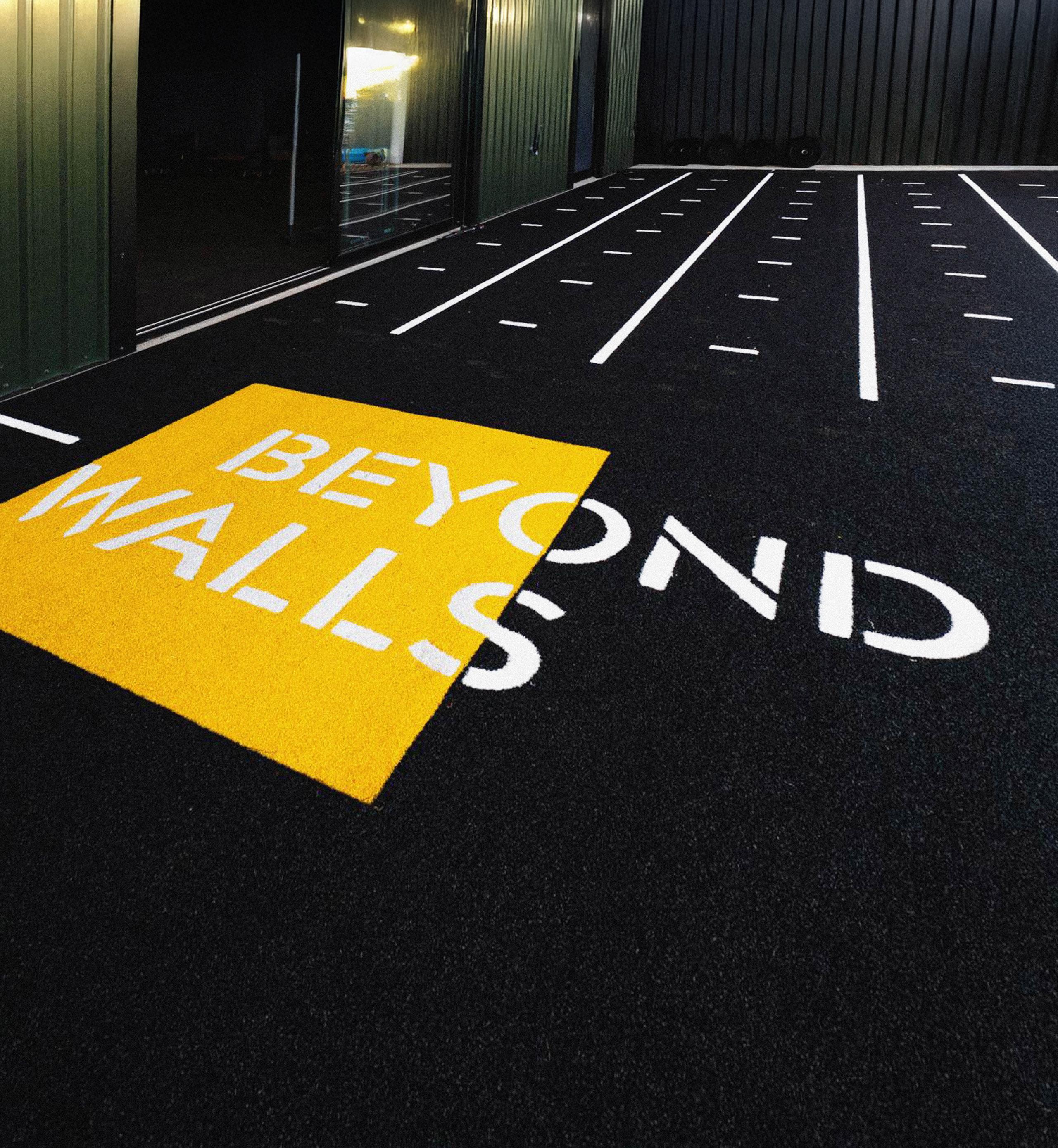



Work has begun on a £20m regeneration project in Sheerness, Kent, which will include the creation of a new community health and leisure hub.
The development is set to transform the town’s Beachfields site, which currently hosts Sheppey Leisure Centre, a healthy living centre (including a GP surgery and local wellbeing charity), play area, paddling pool and green space.
The project will see the existing leisure centre being reconfigured and extended to feature a new fitness suite, purpose-built studios and upgraded changing facilities. There will also be a new TAGActive zone and dedicated adventure play area, modern café and reception
An expanded GP surgery will be relocated within the leisure centre, bringing both health and exercise services under the same roof. Work is also underway on the redevelopment of the outside attractions, including an adventure golf course, outdoor gym and enhanced landscaping connecting the leisure centre to
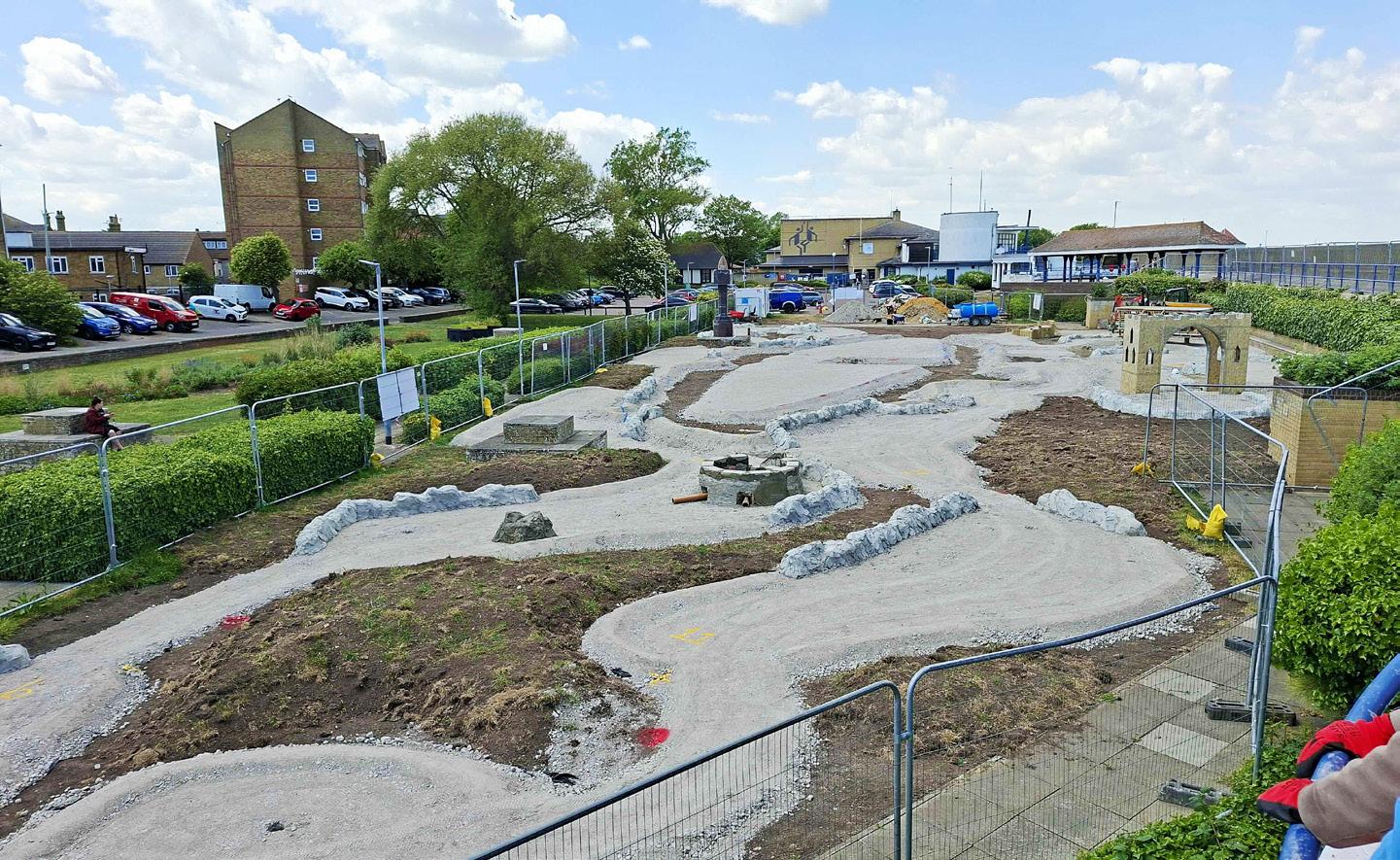
Sheerness train station via improved pathways. Alliance Leisure is leading the project and has gathered together a delivery team which includes Etec as Principal Contractors, GT3 Architects as designers and Varsity Consulting. The facilities will be owned by Swale Borough Council and operated by
Swale Community Leisure. Councillor Monique Bonney, chair of the council’s economy and property committee, said: “It is good to see a spade in the ground on this project. This project will provide health and leisure facilities that will effectively serve the community for many generations to come.”
FitnessGenes, a leading provider of genetic testing for the health and fitness industry, has announced the launch of its first education course designed specifically for fitness and health professionals. This marks an important milestone in the company’s commitment to helping personal trainers, coaches, and fitness professionals apply genetic science to improve client outcomes and boost retention. The course, The Genetics of Physical Performance and Health, is available online and provides a practical, evidence-based foundation to how DNA influences key areas of health, fitness and performance. Designed by FitnessGenes’s in-house team, the course covers traits such as training structure, training response, recovery, injury risk and metabolism – equipping coaches with the knowledge to deliver more tailored programmes.
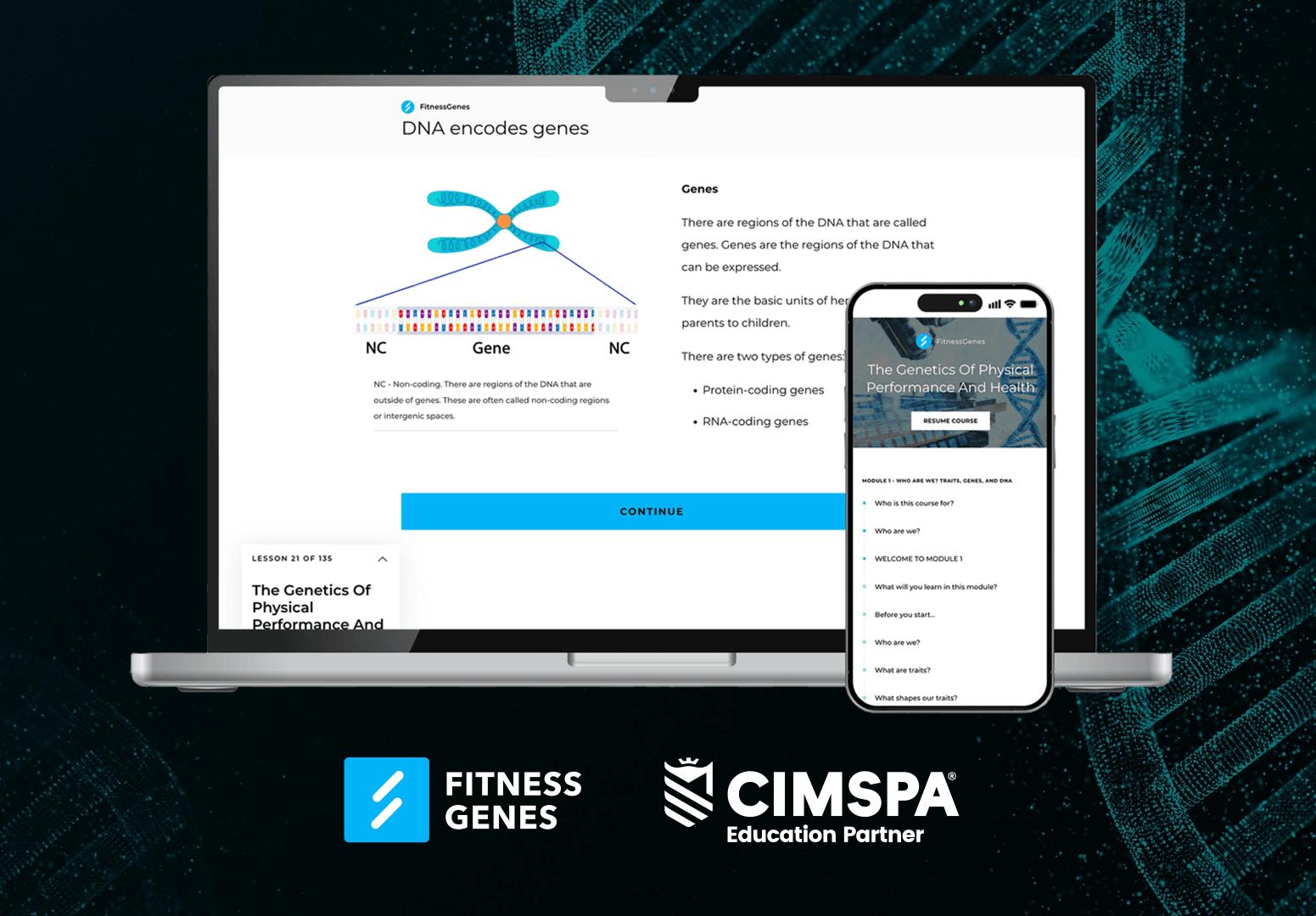
Discover the DHZ equipment range –exclusively distributed in the UK by PSLT
In a fast-moving fitness market, standing still is not an option. Whether you run a boutique studio, manage a national gym chain, or oversee a public sector facility, member expectations are evolving – and your equipment needs to keep pace.
That’s where DHZ and PSLT come in. As the exclusive UK distributor of DHZ, PSLT delivers a range of strength and functional equipment that combines durability, performance, and aesthetic appeal. Backed by end-to-end support, DHZ products are helping clubs across the UK refresh their training zones and inspire their members.
About DHZ
DHZ is a well established brand that has numerous high profile and well known brands across Europe already utilising its equipment. From Fitness First, Easy Fitness, Bestfit Group, McFit and Holmes Place.
Strength that fits whatever your setup
From full-facility refits to targeted zone upgrades, the DHZ range offers incredible flexibility. No matter the size or scale of your site, there’s a solution to fit your space and vision.
Evost III series
DHZ’s flagship selectorised line, Evost III is ideal for high-traffic commercial environments. With consistent biomechanics, intuitive adjustment systems, and a contemporary design, it’s a go-to choice for clubs seeking quality and cohesion across their strength equipment.
Fusion line
For clubs with a premium aesthetic and a need for efficient space use, Fusion’s dual-function machines offer versatility without compromise. This line is perfect for optimising floorspace while maintaining variety in member workouts.

Built for strength and longevity, DHZ power racks are a staple in performance-led spaces. Combined with robust weight storage and ergonomic benches, your lifting zones will not only perform well, but look professional too.
Specialist lines for niche needs
● Defender: Plate-loaded power for serious lifters. These machines are engineered for advanced strength athletes and PT-led training.
● Booty Range: One of the few equipment lines designed specifically for female biomechanics, offering a fresh, inclusive approach to strength training.
● Titan Extreme: For elite setups and functional training zones, Titan Extreme delivers hardwearing performance and versatility.
All ranges are showcased online at pslt.co.uk/gymshop/dhz, but the real value comes in imagining these products in your facility – seamlessly integrated, expertly installed, and delivering results for years to come.
The DHZ range offers flexibility, from full-facility refits to targeted zone upgrades
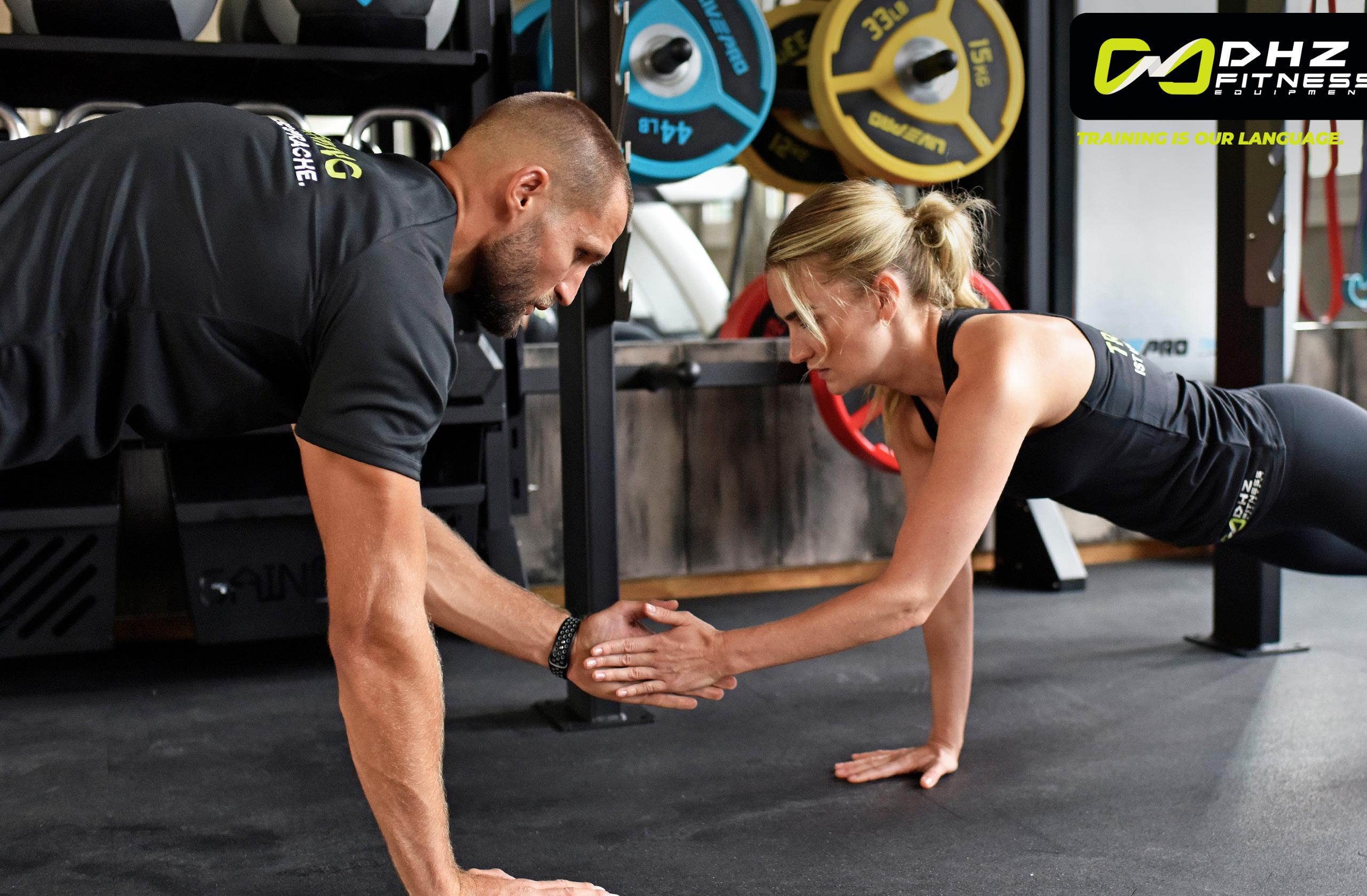
Visualise the upgrade. Tailored to your club DHZ equipment is not one-size-fits-all. PSLT works closely with clubs to plan smart layouts that maximise training space, streamline user flow, and enhance the visual identity of the gym.
Whether you’re introducing a female-specific training area, revamping your free weights section, or upgrading all selectorised equipment, PSLT can help you visualise and plan the entire project, from initial concepts through to floorplans and final install.
Hassle-free equipment changeover with PSLT
Upgrading gym equipment can feel daunting, but PSLT makes the process simple and stress-free. As well as supplying industry-leading DHZ kit, PSLT offers a full-service transition package, helping you remove, replace, and relaunch with minimal disruption. Their support includes:
● Bundle deals across the DHZ range for cost-effective procurement
● Trade-in options for your current equipment
● Professional removal and recycling of outdated kit
● White-glove delivery and expert installation
● Post-installation advice and support to help you get the most from your investment
This end-to-end approach means less downtime, fewer headaches, and a more confident transition, whether you’re refreshing one club or upgrading a network of sites.
As the exclusive UK distributor for DHZ, PSLT has helped hundreds of facilities elevate their training offering. From independent gyms wanting to stand out in competitive local markets, to council-run leisure centres needing reliable, easy-to-maintain strength zones. PSLT understands the challenges and tailors solutions that work in the real world.
The equipment your members train on is central to their experience – and your reputation. With DHZ’s innovative product range and PSLT’s expert support, upgrading has never been easier. Visualise it. Plan it. Install it. Grow with it.
Get in touch with PSLT to explore how DHZ can transform your club.
Call: 01782 280855
Email: sales@pslt.co.uk
View the full DHZ range: pslt.co.uk/gym-shop/dhz
North Norfolk District Council (NNDC) has granted planning permission for the proposed extension and improvement of Fakenham Sports and Fitness Centre. Improvements to the facility will include the creation of a 25-metre swimming pool, outdoor sports facilities and a 3G all-weather artificial grass pitch. The current facilities, owned by NNDC and operated by Everyone Active, comprise a sports hall, fitness suite, multi-use area, dance studio, changing rooms and reception area.
Plans for the 3G pitch will be submitted under a different planning application, however, so that progress on the leisure centre and swimming pool can be made.
An existing pavilion building will be demolished later this year to make way for construction of the new facilities, which is expected to begin before the end of 2025.
The works, estimated to cost around £11m, will be funded largely by a grant from the central government’s Levelling Up Fund.

Councillor Tim Adams, Leader of NNDC, said: “This is a significant milestone towards the provision of modern swimming and leisure facilities in the growing Town of Fakenham, and we continue to be grateful for the support of the community and Fakenham Town Council that
has got us this far. Subject to the approval of the planning application, we look forward to beginning this development later in the year.”
Stuart Jardine, Everyone Active’s area contract manager, added: “This is fantastic news for the health and wellbeing of the local community.”
Keighley Leisure Centre will reopen on Monday 30 June, following the completion of an £900,000 refurbishment. The facility has been closed since 1 February 2025, during which time the building has undergone a full rewire, improvements to the pool including a new filtration system and repairs to the iconic slide.
The works have also included improving the centre’s environmental sustainability with a range of energy saving measures, such as the installation of solar panels.
The centre is owned by Bradford Council and the improvements have been made possible with the assistance of the UK Government’s Swimming Pool Support Fund. Funding has also been received from UK Shared Prosperity Fund, while the rest of the work has been funded by Bradford Council.





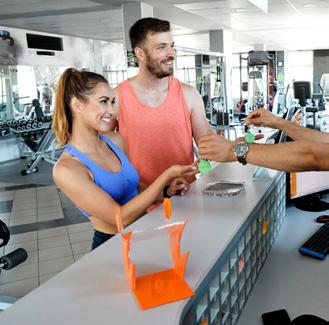




A contractor has been appointed for the project to build a new leisure centre for Bishop Auckland, with work to start this summer.
Durham County Council (DCC) has appointed Morgan Sindall to carry out work on the new-build site, which will create a community hub bringing both leisure services and a library together in one place.
Facilities will include two accessible swimming pools, sauna and steamroom and a large health club with a gym floor and two group exercise studios.
A Move Hub, fitted with powerassisted fitness equipment for people who need support to improve strength and mobility, will also be created. Other facilities will include a soft play centre and café alongside the library, with the aim of creating a place for the entire community.
Councillor Joe Quinn, DCC’s cabinet member for resources, investment and assets, said: “The project is part of our leisure transformation programme to modernise leisure facilities across the county as well as our ongoing regeneration of the town.
“The new venue will bring leisure and library services together in a single, modern site with new features to make our services accessible to all ages and abilities and support community wellbeing.”

Bradford scheme secures £4m funding after “world-leading” results
A programme working in deprived communities in Bradford to get children aged five to 14 and their families physically active has secured additional £4m worth of Sport England funding, after it delivered “worldleading results”. Research into children’s activity levels in Bradford found that the JU:MP programme, operated by Active Bradford, has had a bigger positive effect than any other longterm, population-level physical activity intervention for children so far. Over the last five years, the programme has reached more than 30,000 children and their families to give them more opportunities to be more active through positive movement experiences.
According to a study conducted jointly by the University of Bradford and by Born in Bradford (part of the Bradford Institute for Health Research), JU:MP has improved children’s total physical activity by 8.3 minutes a day and over 70 minutes a week –equating to 3,640 extra minutes per
child a year (or two and a half days). It also found that JU:MP improved moderate-to-vigorous physical activity by nearly 6 minutes on weekdays, while reducing inactivity by more than 21 minutes a day on weekends.
As a result, Sport England has allocated £4 million worth of investment and agreed to a new three-year partnership with Active Bradford to continue the programme.
Lisa Dodd-Mayne, Sport England’s Executive Director of Place, said: “Every child has the right to experience the enjoyment and benefits that being active brings.
“We need every child to have positive experiences of sport, physical activity and movement, in every aspect of their lives, if they are to find a lifelong love of being active. If we get this right, this will be the key to a happier, healthier and more resilient nation. Our work is built on long-term partnerships and will deliver sustainable change in the communities that need it most.”








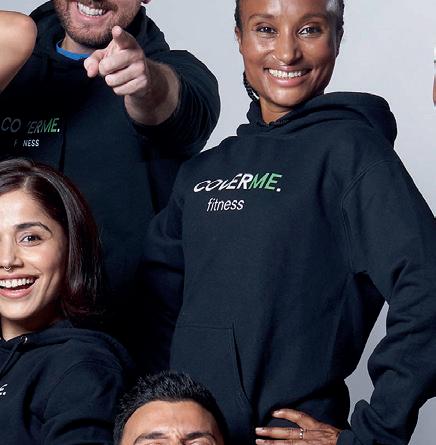











Zoom Media’s new ‘Fit for Loyalty’ white paper explores how retention starts with rewards

Operators are grappling with some serious challenges: tightening margins, skyrocketing acquisition costs, and members with gym polygamy. Against this backdrop, one opportunity is staring us right in the face: loyalty.
So why is the fitness industry still handing out sweat towels or a discount on a protein shake, and hoping for the best? Zoom Media’s new white paper, ‘Fit for Loyalty’, is the wake-up call the leisure sector’s been avoiding for too long.
What if loyalty wasn’t a gimmick, but your biggest retention weapon? While retail, energy and airlines have been running rings around loyalty strategy, the fitness industry has been stuck in the past. Most operators already track retention, monitor churn and adjust their marketing accordingly, but when it comes to rewards, we’re still acting like it’s 2006. The average leisure loyalty programme is either generic, ignored or completely invisible.
Breaking it down:
● Acquisition costs are through the roof
● Members are more non-committal than ever
● Most loyalty programmes are generic and totally forgettable
Zoom’s research shows that 1 in 5 members choose or stick with a gym because of the rewards on offer. That’s not a nice to have. That’s 20% of your revenue base practically raising their hand and saying: “Make me feel appreciated, and I’ll stick around.”
A free protein shake after 12 visits isn’t a strategy. It’s a missed opportunity. Fit For Loyalty isn’t just a deep dive into ‘what members want’. It’s a pragmatic, techfriendly blueprint for how to build something better.

Here’s what Fit for Loyalty is shouting from the rooftop:
● Members crave real, personalised value
Operators should be looking at how they can give their rewards a clear monetary value, with products and services of genuine interest to the individual.
● Behaviour-based rewards can help boost healthy habit-building Members are much more likely to make healthy choices away from the gym if they feels it’s reflected in their rewards.
● Data is the goldmine and most gyms aren’t even scratching the surface
With a flood of information now provided by wearables, integrating this information into a rewards platform can help further integrate operators into their member’s everyday life.
● Gamification = engagement
Having milestones in your loyalty programme ensures there is always something for the customer to work towards.
It’s a pragmatic, tech friendly blueprint for how to build something better
Zoom Media has been delivering expertise in the fitness and leisure industry for over 15 years, and has continuously championed innovation to support operators’ growth and development. Identifying the demand for loyalty programmes among gyms and leisure centres, we’ve developed our own, whitelabel rewards platform to integrate with partners. A unique loyalty programme tailored specifically to members, boasting features that motivate members and increase retention rates. Loyalty is no longer a back-burner project. It’s front-line retention. And the operators who move first? They win.
● Download the white paper to find out how Zoom can help you build your loyalty platform: https://uk.zoommedia.com/fit-for-loyaltyhow-retention-starts-with-reward/
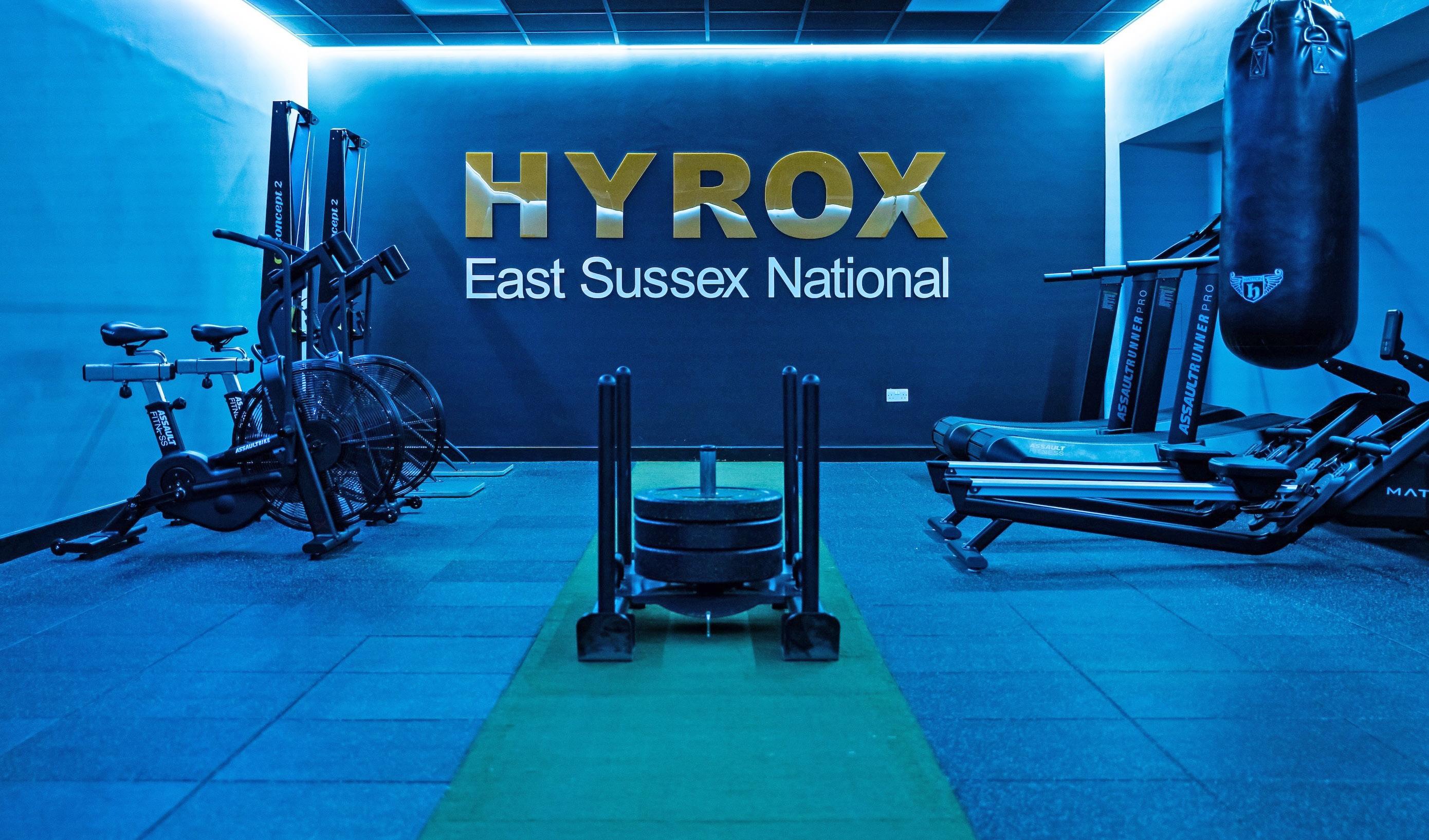
The East Sussex National Hotel Resort, part of the Countrywide Hotels group, has unveiled a fully refurbished health club in partnership with Matrix Fitness.
The revamp includes new gym equipment, an upgraded indoor cycling studio and the launch of a brand-new HYROX Studio.
The hotel’s Health Club now features 50 stations equipped with Matrix Fitness’s technology, including Endurance Cardio touch-screen machines and Ultra pin-loaded strength systems. The cycling studio now boasts 15 Matrix Fitness CXP bikes.
Phil Sanders, Spa and Health Club Manager at East Sussex National,


said: “This marks the start of a major transformation for us. Our mission is to deliver the best health and wellbeing services for all members and guests.
“In the hospitality industry, a gym or health club is a critical amenity that influences booking decisions. Our updated offerings ensure we remain diverse and top-class
“We’re proud of the variety we offer, we have something for everyone, all ages, abilities and goals.
“With over 40 instructor-led classes per week, we are a diverse, inclusive and comprehensive wellness service that caters to all fitness needs.
“We’re committed to delivering top-
tier services to improve retention, which is vital. Our members keep returning because we continually innovate.
Balancing the preferences of our loyal members while introducing fresh options for younger audiences is key.”
Craig Fawcett, Key Accounts – Hospitality Specialist at Matrix Fitness UK, added: “Modern, versatile gym designs and memberfocused fitness offerings are increasingly essential in hospitality.
“The team at East Sussex National has created a standout approach that perfectly complements the premium resort, offering a wellness journey tailored to all abilities and goals.”



















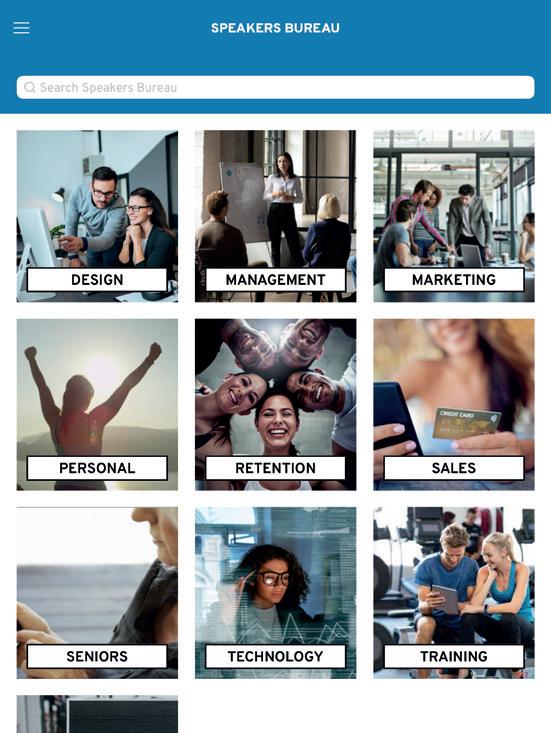








Welcome to the VirtualRoadshow.App… Welcome to the future of fitness education.







Have you ever gone to a conference and seen a great presentation and gone back to your Club and tried to describe what you learned to your staff, and something seemed to be missing in your description?











Well, with the VirtualRoadShow.APP you can literally show them, pause and discuss, rewind, fast forward. Stop… and then it’s there to be viewed again and again for a refresh, or new hires. You’ve literally got a 24-hour Conference in the palm of your hand…







Scan the QR code, register online in the Virtual Store at www.VirtualRoadShow.online, download the .APP, log in and start your £1 Try All today.



Every Thursday at noon GMT one of our presenters, trainers or coaches from the world of fitness deliver unrivalled guidance, advice, training and support on building, growing, and scaling your gym business.
From leadership, to coaching, to marketing, to sales, and beyond.
✓ Hours and hours of Actual Experience… condensed down into one-app. over one hour.
✓ Designed to help you and your staff learn, how you want, when you want!
✓ Scan the QR code, download the app and start your £1 trial today.
✓ All presentations are archived within the app so as well as a weekly live stream, you and your team will get access to the Virtual Roadshow archive.... A library of limitless advice, guidance and support that builds week on week as content is added...
✓ View them on your phone or tablet 24/7 - 365 days a year.
Pete Cohen Frank Furness
David Minton Colin Milner
Adrian Marks Dr. Paul Bedford
Dave Stalker Benny Price
Dan Lynch Jon Nasta
Doug Miller Bryan O’Rourke Dr Mark Slavin Justin Tamsett
Casey Conrad Laurie Metrick Lexie Griffiths Alan Leach
Fred Hoffman Sandy Coffman Hans Muench Herb Lipsman
Joanne Groves Richard Boyd
Peter Webb Cristophe Andanson Henrik Gockel Jarrod Asracco
Our Speakers Bureau have over 1,000+ YEARS of Actual eXperience.
Our Current Alumnus of presenters, educators and trainers in our Speakers Bureau include: Our aim is to help you
Bobby Cappuccio Michael Scott Scudder
Lesley Aitken Ray Gordon Derek Barton Ulf Bengtsso
Rob Lander
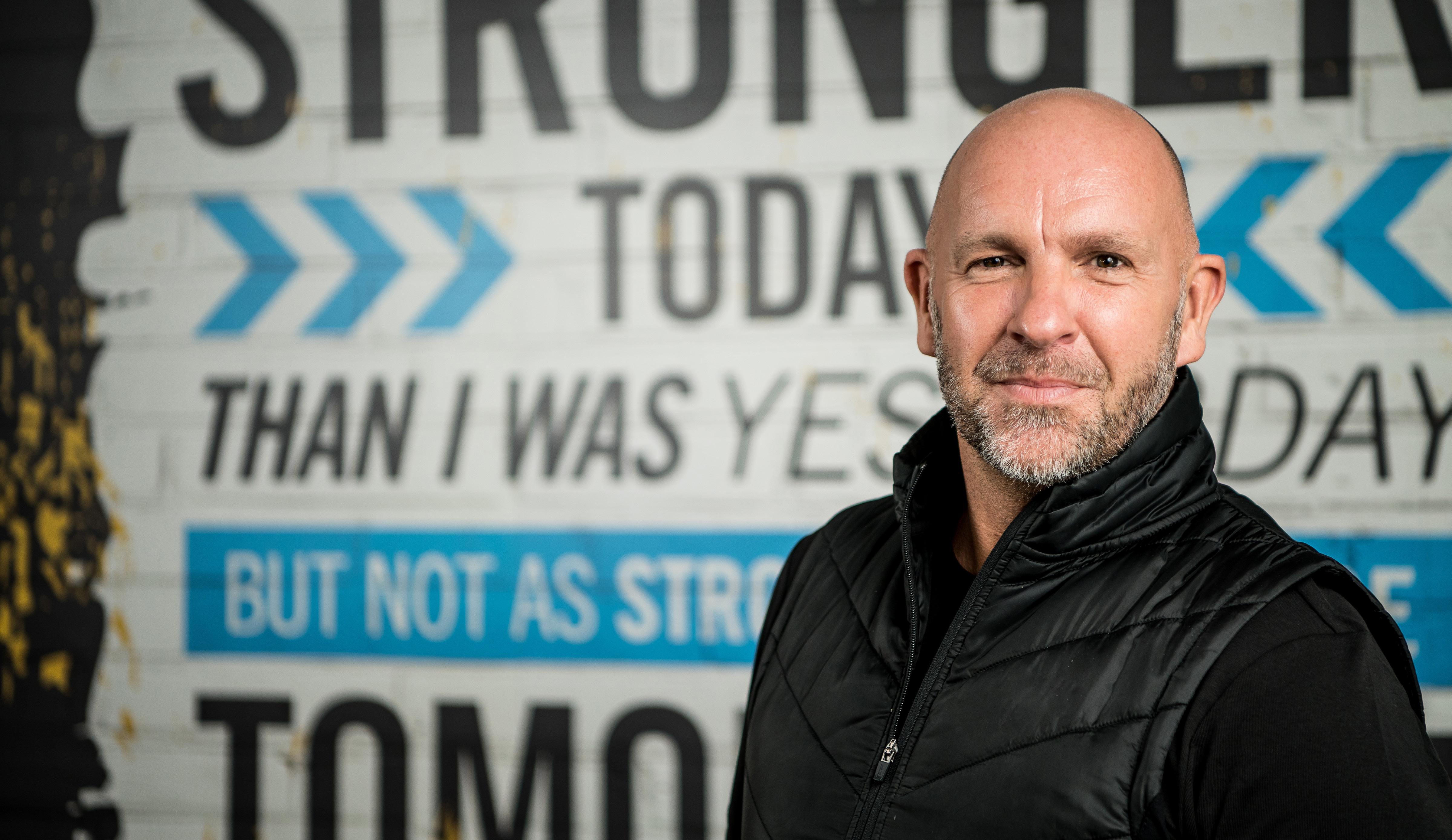

The market had changed. Gas and electricity prices had sky-rocketed, and any new agreement meant astronomical costs. Some of our bills increased by over 400%. That’s not a typo - 400%.
For a charity operating swimming pools, large leisure centres, gyms and sports halls—these are huge, 7-daya-week operations - this wasn’t a bump in the road. It was a wall. Our monthly energy costs were suddenly higher than some organisations’ entire annual budgets.
We looked at every option. We took expert advice. We shopped the market. But no matter where we turned, the outcome was the same: energy costs had become a major liability, and we were the ones expected to carry it.
Our monthly energy costs were suddenly higher than some organisations’ entire annual budgets
during the second phase. But those funds weren’t for now - they were for capital works to reduce energy use in the long term. That’s important, but when you’re haemorrhaging cash today, telling you savings will come in ten years’ time isn’t just unhelpful - it’s devastating.
We also turned to local authorities for emergency support. In some cases, they did offer help - but with terms that made it feel more like a trap than a lifeline:


This is where it really started to hurt - not just financially, but emotionally too. Because we weren’t looking for handouts. We were looking for fair, timely support so we could keep serving communities.
We applied to the Swimming Pool Support Fund, a national pot designed to help exactly with this problem. But across five local authority partnerships, we weren’t awarded a single penny in the first phase. Not one site. The feedback from Sport England? Too much demand. Not enough to go around. Eventually, we were successful in two applications
● Funding was offered in small monthly amounts, impossible to plan against.
● Support came with major changes to contracts, often written to allow councils to walk away at any time.
● There was little or no acknowledgement of the pressures we were facing - or of the work we’d done to bring participation and community outcomes back post-COVID.
We needed partnership. What we got, in many cases, was bureaucracy and risk.
We
Defending ourselves while the bills kept coming
To make things worse, some councils questioned the decisions we made about our energy contracts - after we had signed them and after prices had already surged. They held back funds while they looked into our procurement processes, assuming we’d “chosen badly.”
This ignored the reality we were living in: there were no good deals. Everyone was facing the same sky-high prices. We were simply trying to keep the lights on – literally and figuratively.
While we were trying to explain our decisions, the bills didn’t pause. Cash reserves drained faster than we could replenish them. Every week spent waiting for a reimbursement put us deeper in the red.
A charity that refused to give up
Through it all, we kept going. We didn’t panic. We didn’t stop serving. We didn’t compromise our purpose.
We adapted, we fought, and we held the line - because we believed in what we were doing, and because our supporters, staff and communities needed us.
The truth is, this wasn’t a failing charity. This was a charity caught in a perfect storm:
● Crushing energy costs with no relief
● Delayed or conditional funding from multiple directions
● A recovery system that looked good on paper but didn’t work in practice
● And a national picture where too many leisure providers were left to sink or swim alone.
The final reality
We didn’t run out of ideas. We ran out of runway. And that’s what led to the incredibly difficult decision to enter voluntary liquidation.
It’s heartbreaking, because it wasn’t the quality of our work, our people, or our vision that failed. It was the environment around us that made it impossible to continue - despite everything we got right.
We want this story told clearly, because it matters. Not just for the record, but for the future of our sector. Because unless something changes - unless the funding is fair, the support is fast, and the system is actually designed to help - this will happen again. And good organisations, doing great work, will be lost.
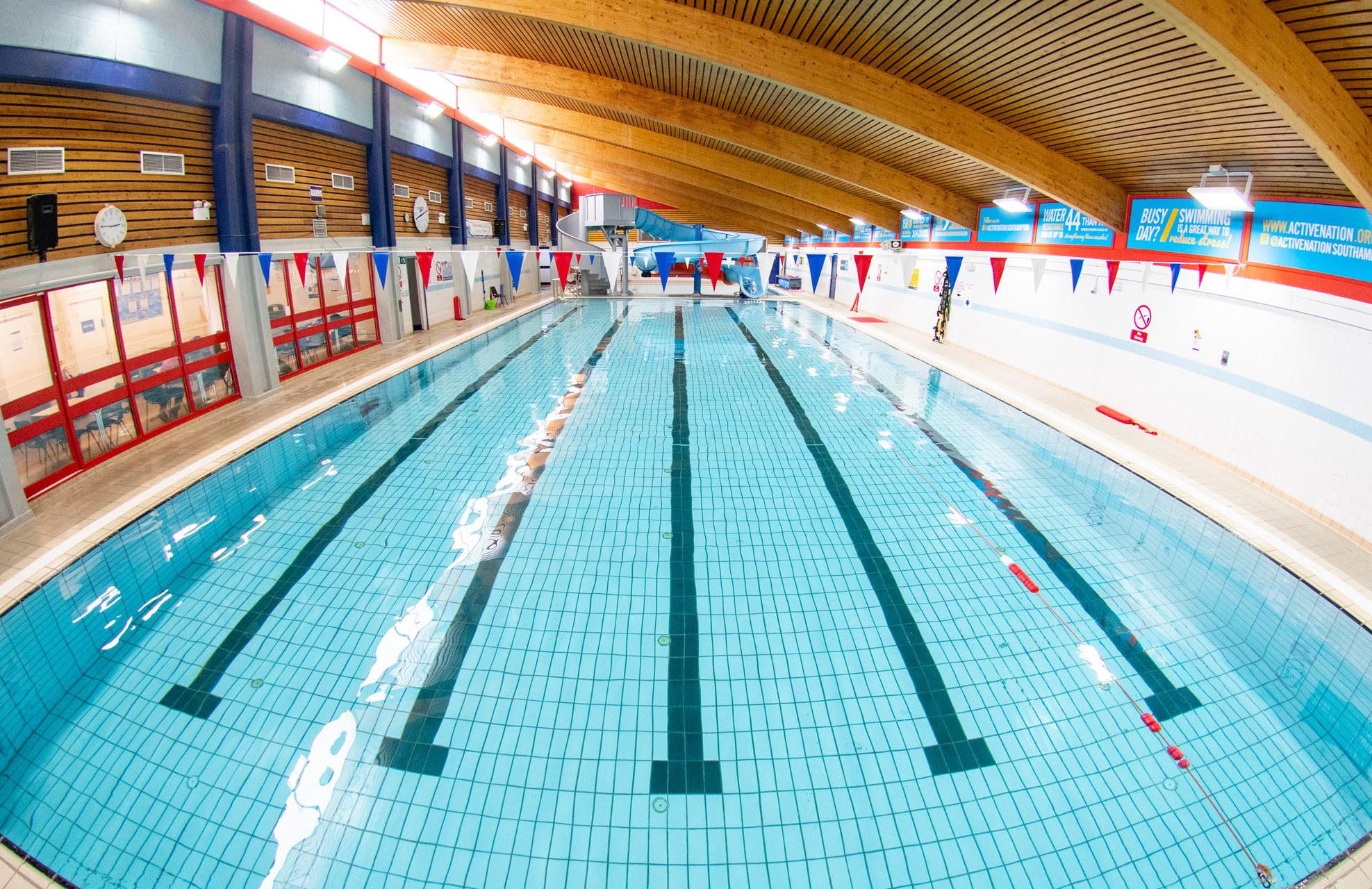
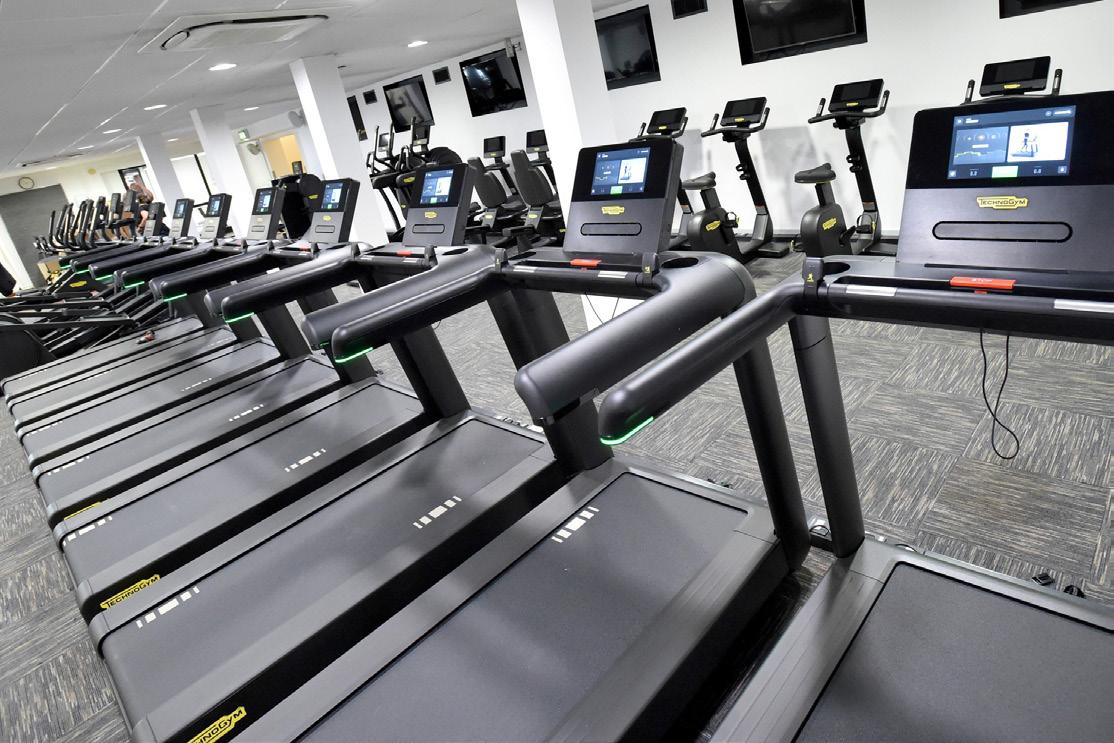
Growth and excitement
We took on new clubs, ready to grow our impact and reach more communities. There was real momentum and optimism about what lay ahead.
COVID hits
Just as the new clubs were due to launch, the pandemic struck. Lockdowns, tiered restrictions and repeated closures meant we couldn’t get going properly. Despite clubs being shut, the bills kept coming - leases, utilities, and other fixed costs continued to pile up. Trying to exit some of those leases was incredibly difficult, and our reserves started to wear thin.
Recovery Fund support (sort of)
We did get some help through the National Leisure Recovery Fund, but it only covered about half the charity. Many of our outdoor venues didn’t qualify. Accessing the funds wasn’t straightforward eithereach local authority handled things differently, and payments were slow. In most cases, we had to pay reopening costs ourselves and wait to be reimbursed.
Most breaks on management fees came with the catch that they had to be repaid later. And we couldn’t easily adjust prices because of contract restrictions, even though costs were going up everywhere.
Bouncing back
In spite of it all, we saw a fantastic bounce back in participation, getting back to - and beyond - pre-COVID levels, ahead of national averages. We worked incredibly hard and adapted subscription offers to keep things affordable. We were finalists at the ukactive awards for the marketing initiative that achieved these results.

Energy costs go through the roof
Just as we were getting back on our feet, the energy crisis hit. Our old contracts ended, and the new ones were astronomical - energy bills shot up by 400%. That alone was devastating.
Getting reimbursed through energy benchmarking took ages, and some councils challenged our energy deals instead of helping. We spent months trying to justify decisions we’d made in good faith - meanwhile, the bills didn’t stop.
2023–2024
Little support when it mattered most
We applied for help through the Swimming Pool Support Fund but didn’t receive a penny in the first round across any of our local authority sites. Sport England said demand was too high. Two of our sites got support in round two, but it was only for future improvementsnothing to help with the crisis we were in right then.
We asked councils for support. A few offered some, but it often came with strings attached- monthly drip-fed payments, contracts that could be pulled at any time, or big changes that made the offers almost unworkable.
2024–2025
Fighting to keep going
We kept going because we believed in our mission. Sales were strong, people were coming through the doors, and we were doing everything we could to manage cash. Under normal circumstances, with energy prices at pre-crisis levels, we would’ve been running a surplus.
April 2025
No more runway
Despite all our efforts, we ran out of road. The energy bills were just too much. Support came too late, or not at all. We had to make the tough decision to enter voluntary liquidation.
Re��ections from the 2025 Fit Tech Summit Hosted by ALTA Technology Group in partnership with LeisureLabs
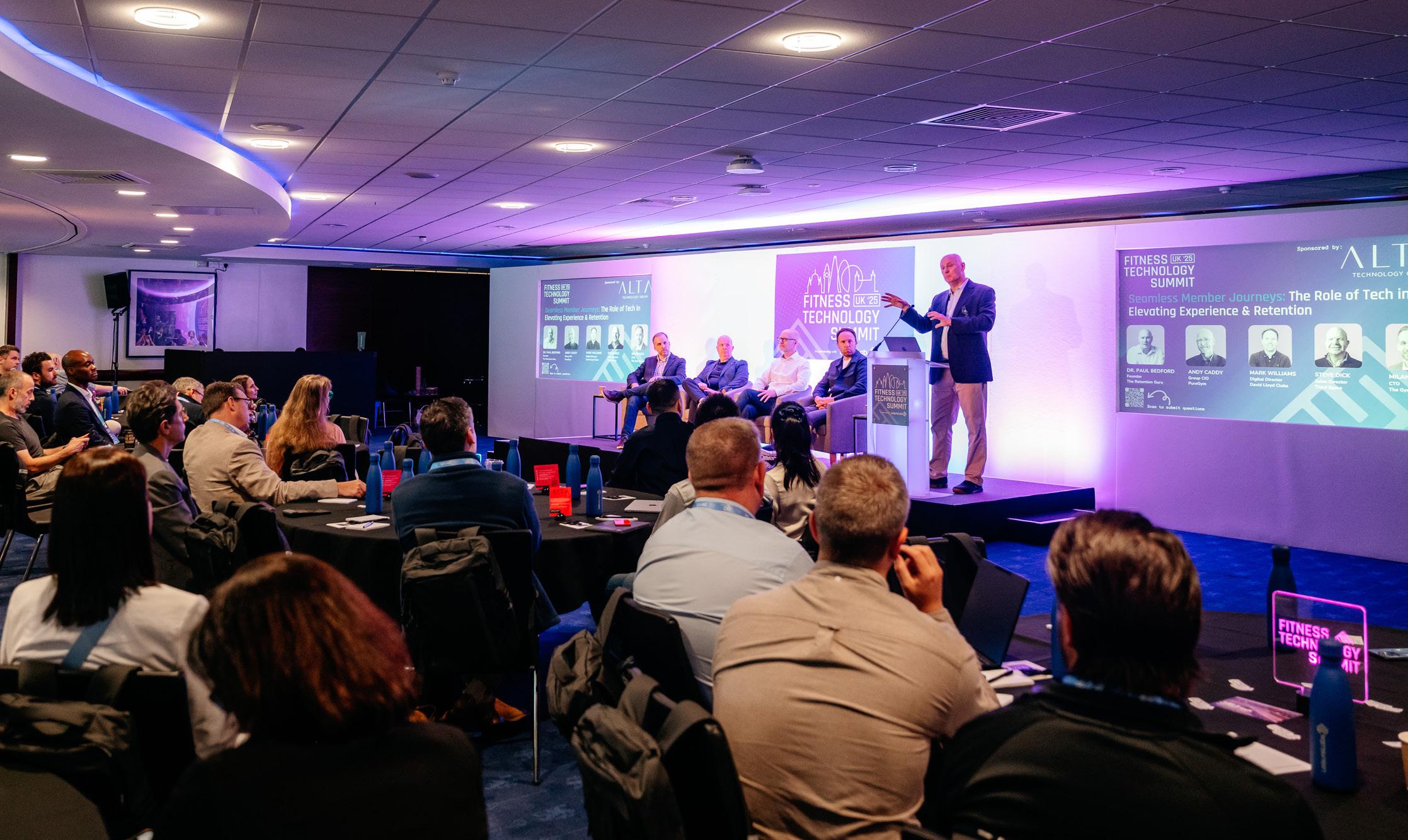

Over 150 industry leaders, 50 top brands, and one big question: how do we turn tech from noise into impact?
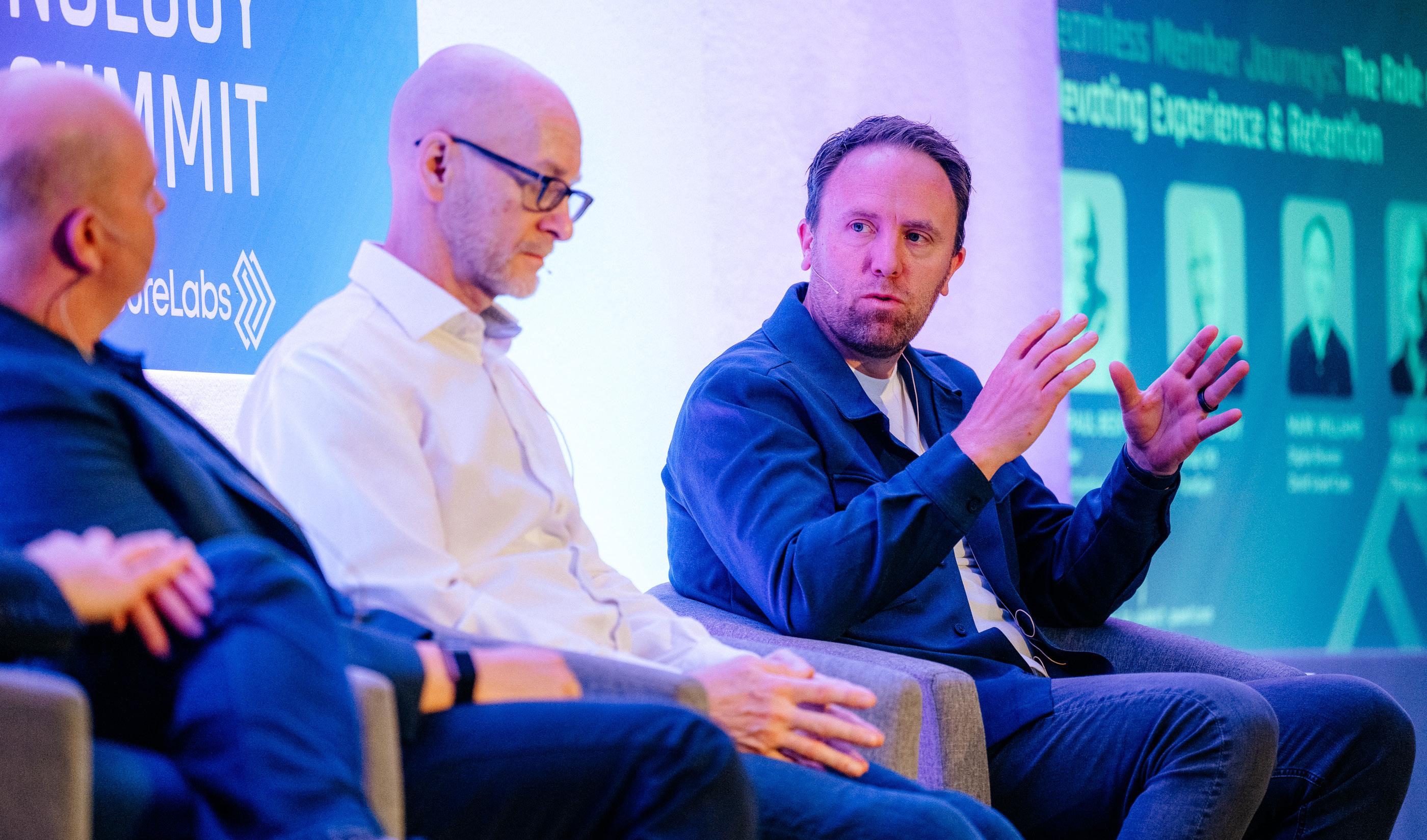


The first European Fitness Technology Summit, hosted by ALTA Technology Group and LeisureLabs, created a rare moment of convergence.
For one day, senior leaders, key decision-makers and entrepreneurs from across the fitness sector came together to explore not just what’s changing, but why it matters and what needs to happen next.
Held at the iconic Stamford Bridge Stadium, home of Chelsea Football Club, the event welcomed over 150 guests from around Europe, with over 100 club operators representing 50 of the industry’s leading brands. The result was a unique environment designed for meaningful connection, discussion, and peer exchange.
Set against a backdrop of accelerating technological advancement and rising member expectations, the Summit offered a blend of clarity and challenge. It wasn’t just about sharing ideas, it was about pushing the conversation forward.
From debate around GLP-1 to the unveiling of LeisureLabs’ exclusive Technology Industry Benchmarking Survey, the Summit positioned itself as essential for senior leaders in health, fitness and wellbeing.
The GLP-1 Generation: Preparing for a new kind of member
The continuing health crisis was at the forefront of discussion, not as an abstract problem, but as a present and urgent reality. In a standout panel led by Alex Peacock, industry leaders discussed how innovation can address systemic health challenges. The conversation quickly turned to GLP-1 medications, which are now reshaping the member landscape.
While uptake is increasing, many operators remain unprepared for the implications these drugs present, including stigma, re-engagement challenges, and the need for new onboarding and coaching approaches.
“It’s not their first attempt - it’s their first time being understood,” was among the key take aways. The message was clear: it’s time for the fitness sector to evolve its approach to inclusivity and support.
The data paradox: From overwhelm to impact Data was everywhere, but what emerged was a sharp focus on value. How do we move from data accumulation to meaningful application?
Club operator, Third Space, presented a compelling case study on training personal trainers to interpret WHOOP data, turning numbers into insights that impact client experience.
Discussions also addressed wearables, app integrations, and building reward systems such as streaks – all with a common thread: data should drive action. If it doesn’t influence behaviour or decision-making, it adds little value.
LeisureLabs’ Benchmarking Survey: a mirror to the industry
One of the most talked-about moments of the day was the unveiling of LeisureLabs’ 2025
Technology Benchmarking Survey. Drawing responses from businesses representing over 21 million members, it offered a unique snapshot of current priorities and gaps:
● 74% of operators plan to increase their technology budgets in the next 2–3 years, yet many teams remain under-resourced
● 62% are testing AI tools, but only 11% have deployed them at scale
● Legacy integrations are cited as the biggest barrier to progress
● Few operators are effectively tracking personalisation, despite identifying it as a key priority.
More than a report, the survey provided a catalyst for reflection. Attendees were asked to identify where their own organisations were aligned, and where they had blind spots. For many, the results were eye-opening.
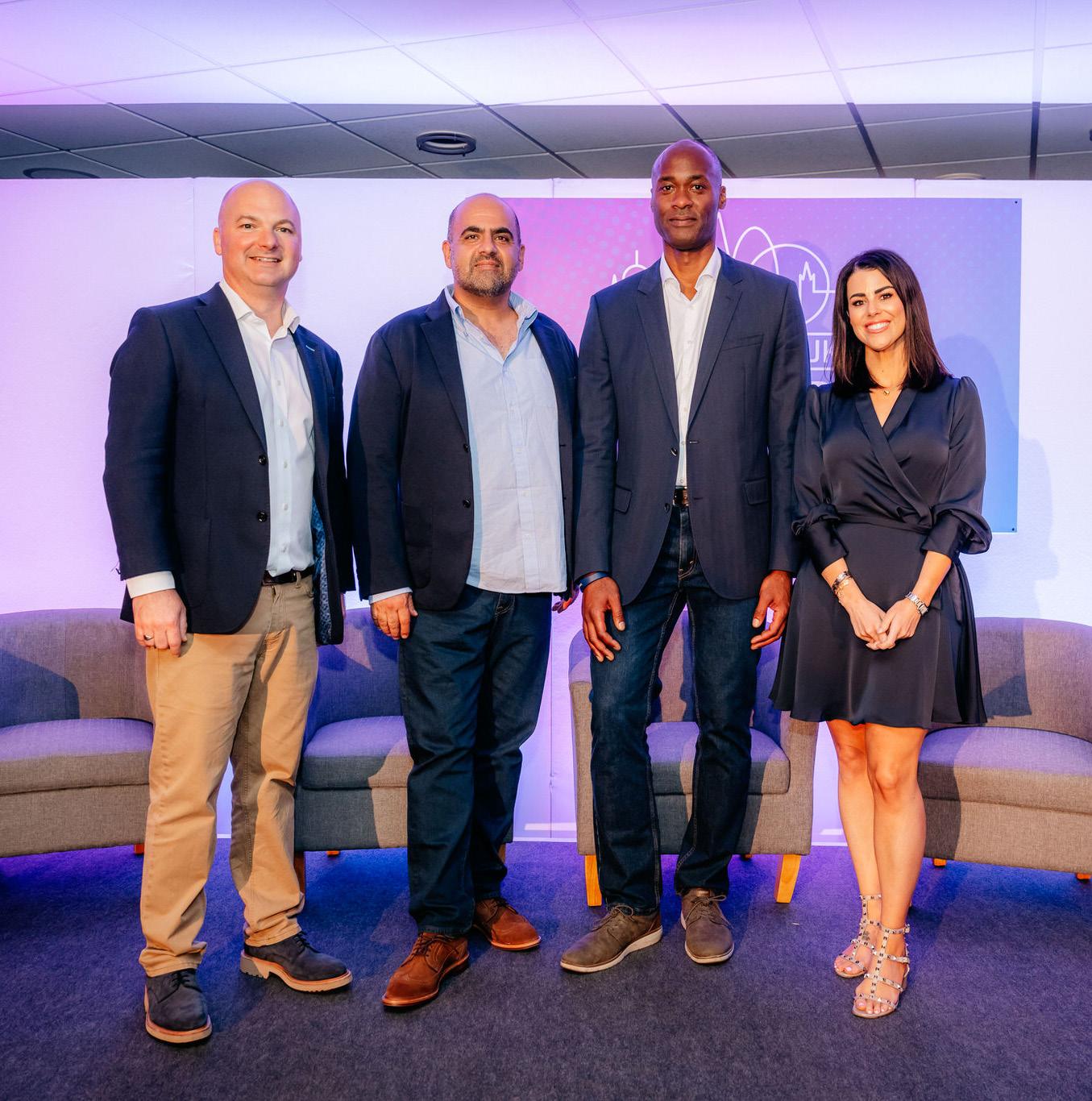
Closing the day was an energetic keynote by Henry Coutinho-Mason, who helped shift the conversation around AI from hype to practicality.
“AI won’t replace your trainers - it’ll replace their admin,” he said. Delegates also explored how AI could support smarter space design, optimise operations, and augment member experience, all while keeping the human connection at the centre.
Despite the growth in tech, motivation remains elusive. Behavioural psychology, gamification, and reward systems all came under the microscope.
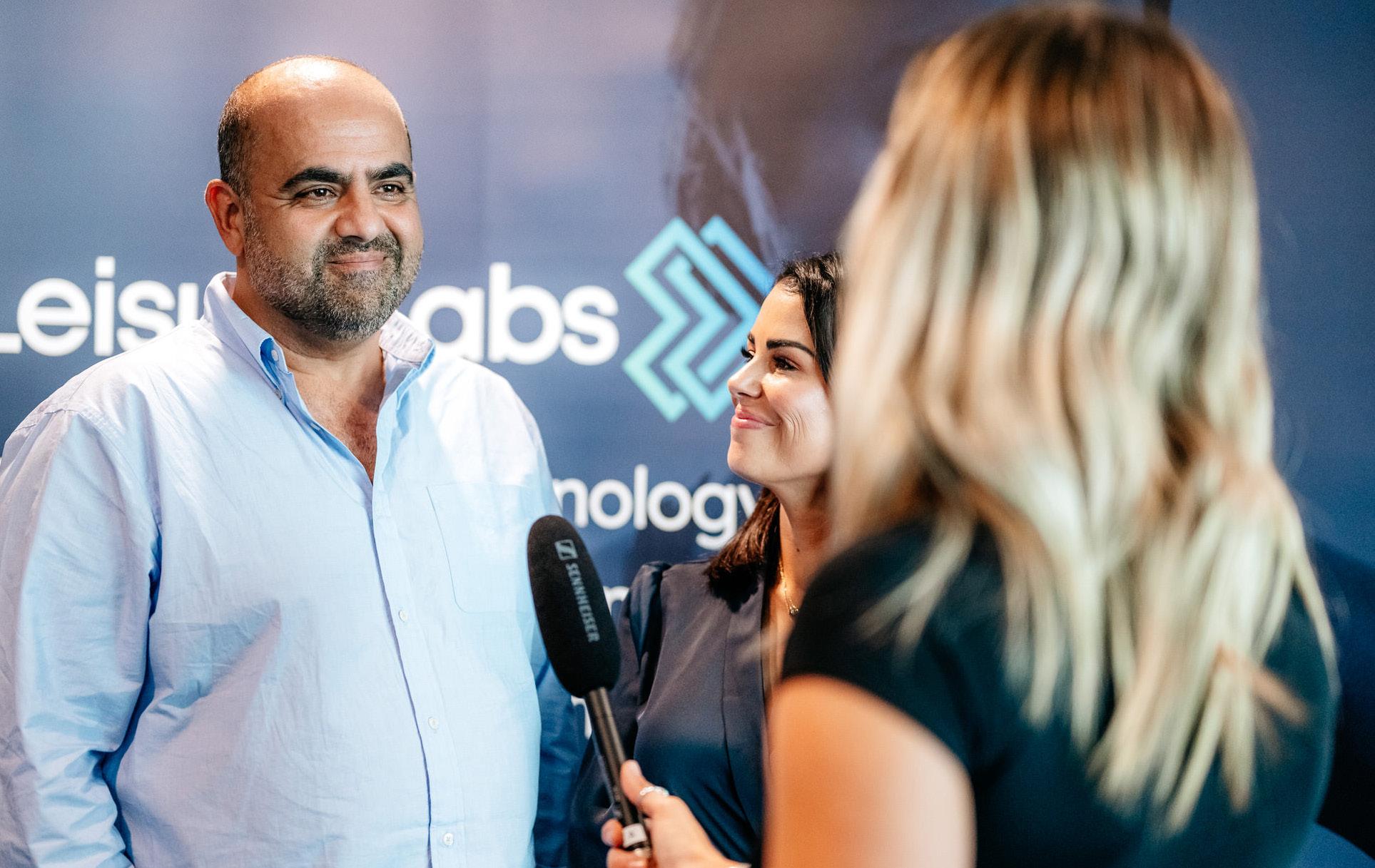

One compelling shift in thinking focused on reframing motivation: rather than asking members for goals, ask how they want to feel.
Asking “how do you want to feel” after going to the gym, instead of “what’s your goal?” was also identified as an important shift; The emotional lens offers a more personal and sustainable way to design engagement strategies.
The CEO panel included Shafiq Ahmed, CEO NRG Gyms, John Penny, Managing Director of Third Space, Martin Seibold, CEO, LifeFit Group and Joanne Mathews, CEO of TenHealth & Fitness emphasised one powerful truth: no tech tool will fix a disengaged culture.
Discussions highlighted:
● Hiring based on emotional intelligence
● Building an adaptable, responsive team
● Empowering staff to engage with data, not just collect it.
The point wasn’t theoretical – these were active practices being implemented by successful operators.
The real work starts now
The Summit made one thing clear – technology alone will not fix the industry’s challenges. We are still facing
a long-term health crisis, and while GLP-1 and digital tools offer promise, they’re not a solution on their own. Technology must become more personalised, but only if it’s relevant and useful to the end user. It must be designed with both members and staff in mind, building experiences that feel human, not transactional.
Themes like longevity and wellness continue to dominate discussions, but there is now a growing need to move from talk to tested application.
And while AI continues to polarise opinion, it is unavoidable. The challenge is no longer if we should use it, but how we do so responsibly and creatively.
This year’s event proved something else, too: senior leaders across Europe are ready for a different kind of conversation, one rooted in transparency, evidence, and action.
The Fitness Technology Summit is now firmly established as a must-attend event for operators and decision-makers who are ready to shape the future.
The event returns to London on May 18th 2026.
Register your interest here: https://thefitnesstechsummit.com/#contact Access the full 2025 Benchmarking Report here: https://www.leisurelabs.co.uk/industry-benchmarking-2025/
On the morning of Day 1, delegates gather at Royal Victoria Dock for the CoursePro Open Water Swim — an early start that offers something a little different before the exhibition halls open and the conference begins.
It’s not a race, and it’s not a spectacle. It’s a well-organised, open invitation to get in the water, focus the mind, and meet others in the sector in a shared setting outside the usual routine.
Importantly, the swim doesn’t compete with ELEVATE — it complements it. By encouraging delegates to start the day actively, reflectively and together, it adds a meaningful layer to the wider event experience.
Supported by Swim England, Love Open Water and proudly sponsored by HUBB, the event reflects a shared
commitment to making outdoor swimming more accessible and more central to conversations about movement, recovery and wellbeing. With experienced open water staff and lifeguards on hand, swimmers of all levels are welcomed and well supported.
An early morning with purpose
The swim offers a rare kind of start to the day— fresh air, cold water, and a complete change of pace. For some, it’s a physical challenge. For others, it’s a reset before the noise of the show. Either way, it’s an experience that brings a kind of clarity you can’t get indoors.
There’s something about open water that sharpens your focus. The city fades. The inbox waits. And for twenty minutes or so, it’s just movement, breath, and the feeling of doing something real—before stepping into a packed event.

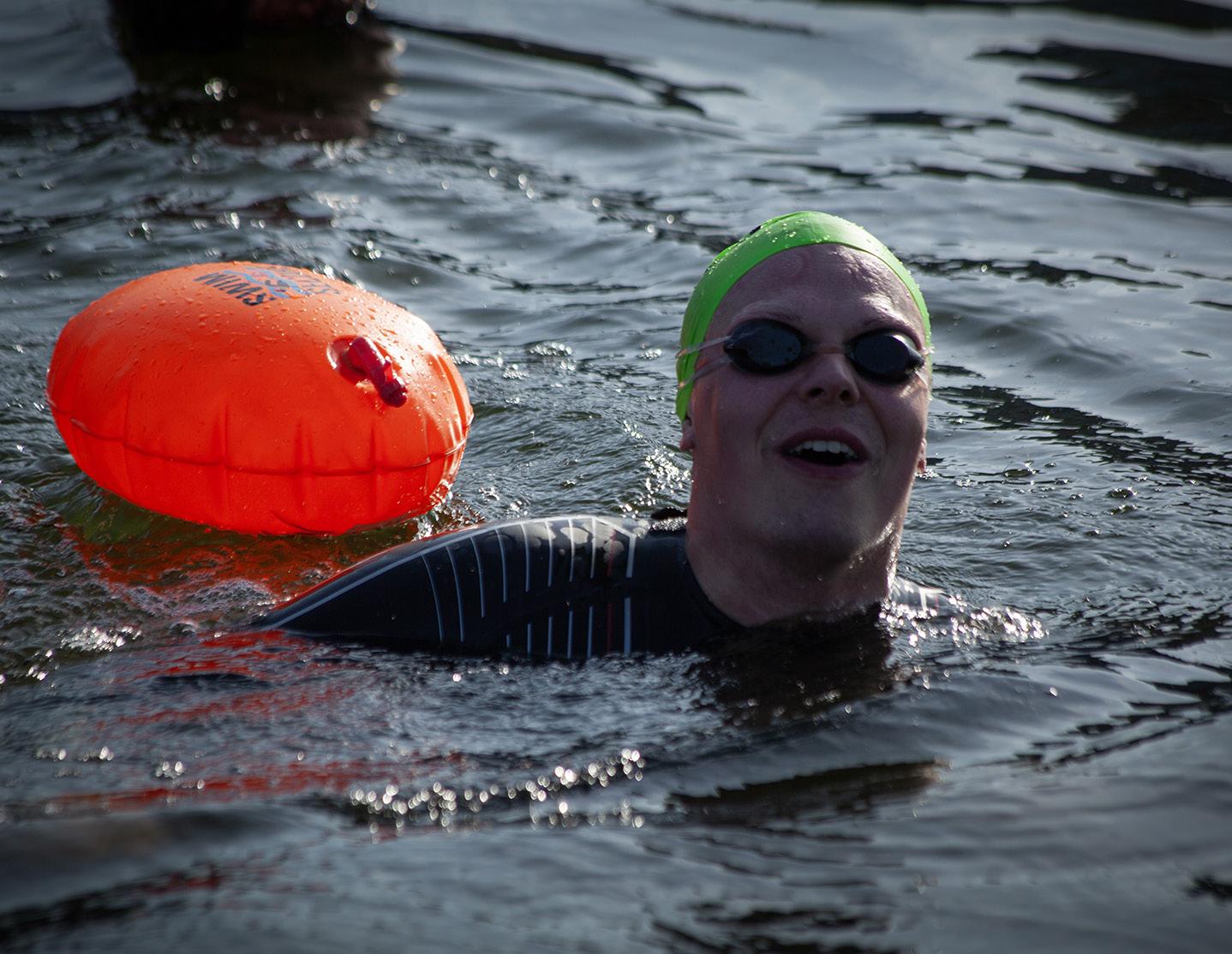
The shared experience of stepping in together tends to break the ice better than any introduction across a conference table.
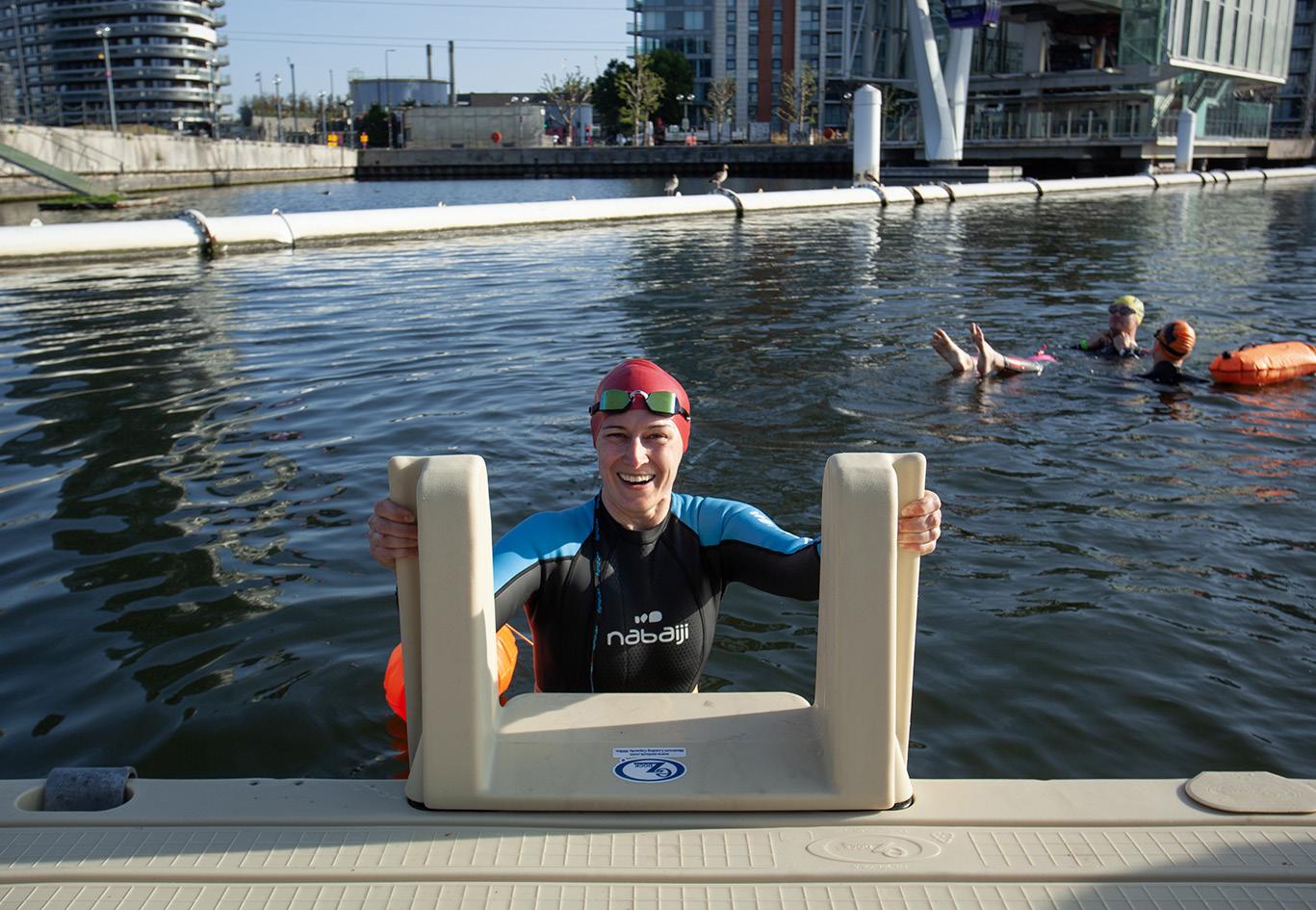

The shared experience of stepping in open water together is a great way to “break the ice”


Once wetsuits come off and everyone starts to warm up again, the group heads to the post-swim networking breakfast nearby. It’s a chance to sit down, have a proper conversation, and enjoy the feeling of starting the day with something meaningful.
Attendees often say it’s where the most useful exchanges happen. Less structure, more openness—and the kind of conversations that lead to real collaboration later on.
The event is run by CoursePro by Fitronics, known across the leisure sector for helping swim schools and centres simplify bookings, attendance, staffing, and communication. The swim reflects that same focus: keep things simple, supportive, and centred on people.
“This event brings people back to why they came into this industry in the first place,” says Marc Jones, Head of Commercial at Fitronics.
“It’s about connection, movement, and starting the day with purpose. We’re proud to host something that feels authentic to the people it’s for.”
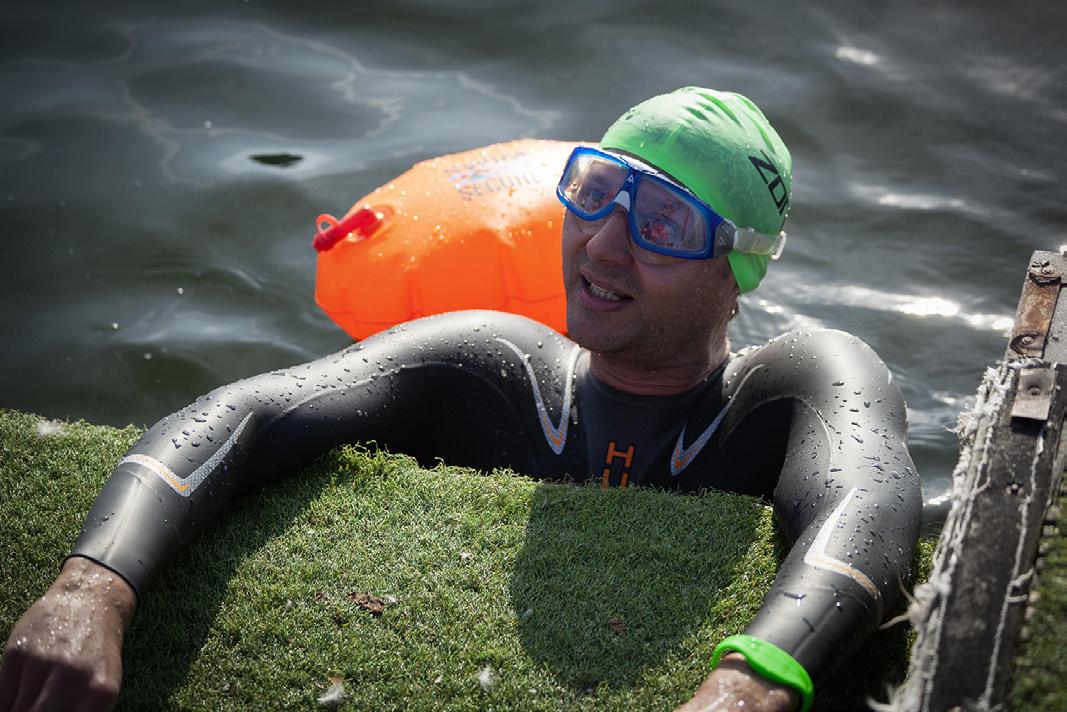
It’s about connection, movement, and starting the day with purpose.
Rather than talk about creating space for progress, CoursePro demonstrates it—with real action, in open water.
Whether you’re reading this the week before or flipping through these pages with a postshow brew, the CoursePro Open Water Swim is something people remember—not because it’s flashy, but because it’s genuine.
For those who took part: it’s already a highlight. And for those who didn’t: it’s the kind of start to the day that stays with you.
● Learn more about the event: www. fitronics.com/coursepro-open-water-swim-event
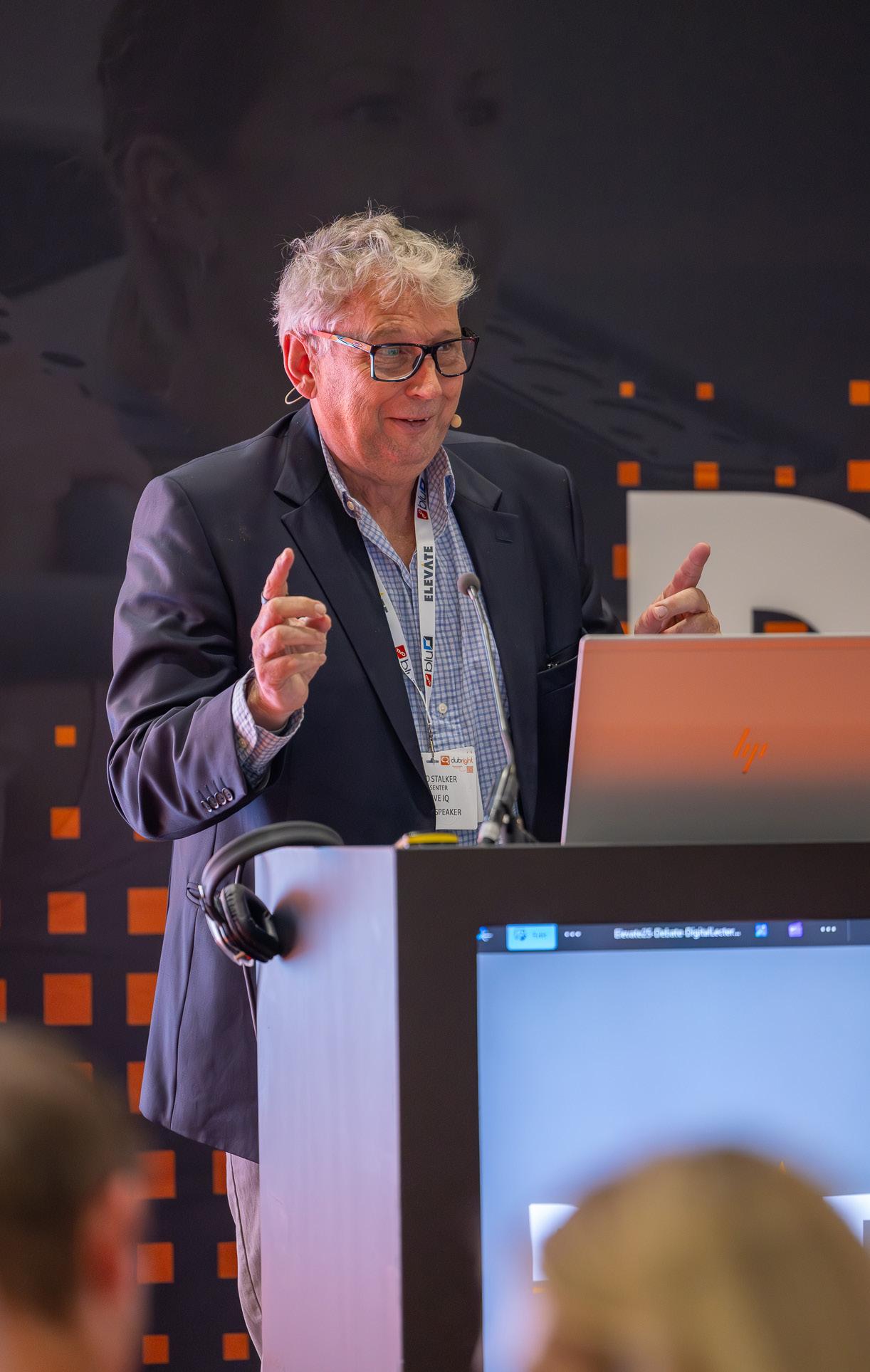
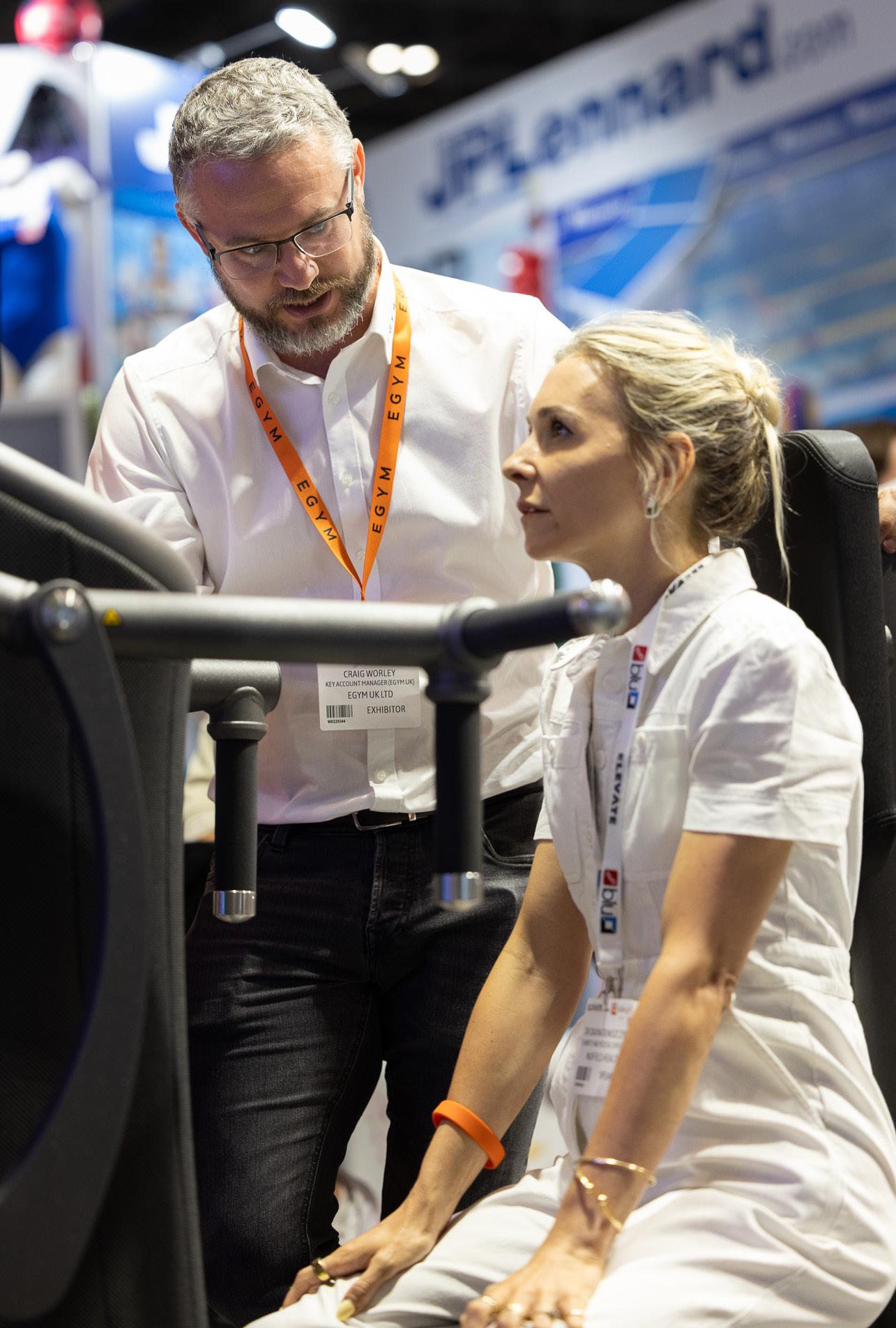


This year’s Elevate trade show at Excel London was its biggest edition yet. The event, which brings together physical activity, fitness, health and leisure professionals, welcomed over 6,500 delegates, hosted 200+ brands and delivered a wide-ranging educational programme – as well as plenty of opportunities for networking.
With more than 8,000sq m of exhibition space and representation from both established industry leaders and 48 debut brands, this year’s show offered a dynamic glimpse into the future of physical activity. From innovative product launches to powerful discussions across 12 dedicated content streams, Elevate 2025 set a new benchmark for trade events in the sector. The free-to-attend education programme featured more than 200 speakers across four Elevate-curated theatres; Debate, Generate, Accelerate and Collaborate, plus five partner-led stages. These included FitPro LIVE, Active Kids, Active Aquatics, Technogym Education Theatre and Third Space Academy.
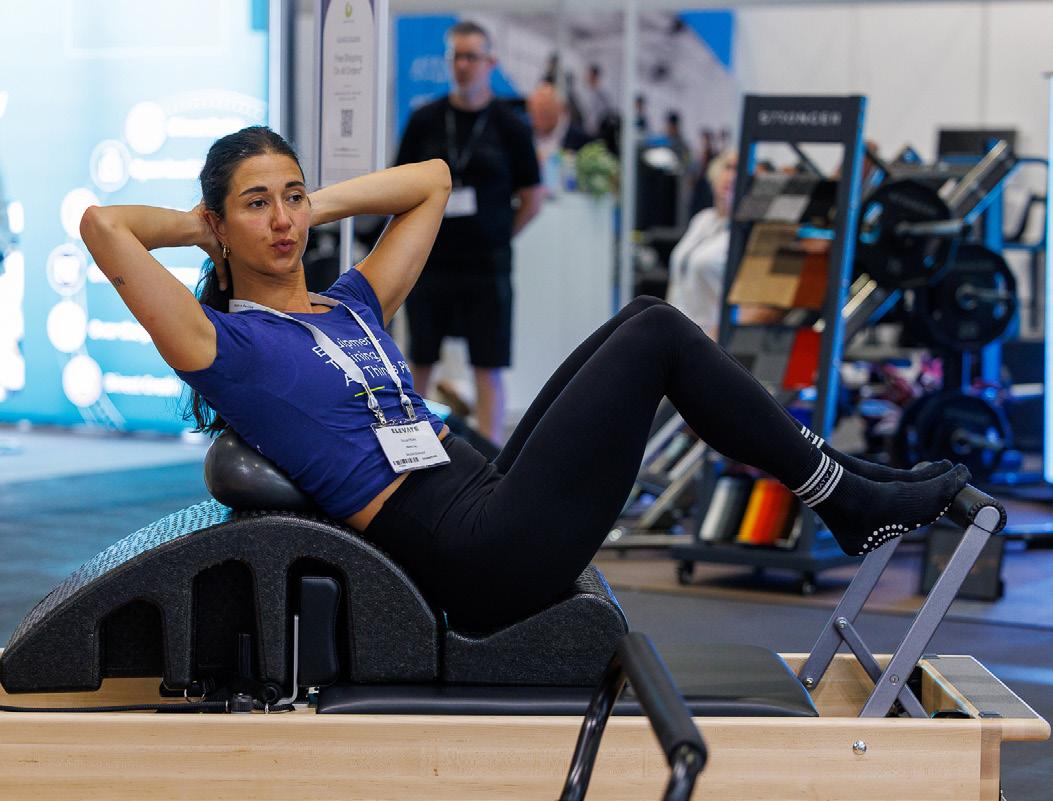
Elevate provided a valuable platform to connect with the UK market and showcase our Pilates equipment and education. We led two packed seminars on the business potential of Group Reformer, exploring programme design, ROI and instructor training. The event’s community-driven atmosphere fostered meaningful conversations with current and future partners
Chanin Cook, Marketing Director, Balanced Body


“The response to Elevate 2025 has been incredible” says Lucy FindlayBeale, Event Director at Elevate. “From the energy on the show floor to the standing-roomonly education sessions, the response from the industry has been phenomenal. “We’re incredibly proud to have created an event that not only showcases the best our sector has to offer, but also drives meaningful conversations and collaboration.
“The feedback from exhibitors and delegates alike has been overwhelmingly positive, reinforcing Elevate’s role as the central hub for innovation, learning and connection. As we look ahead to our 10th anniversary in 2026, we’re more committed than ever to growing with the industry and delivering even more value to our community.”
This year’s educational highlights included the CEO session on the Debate Theatre stage, interactive sessions on AI and GLP-1s, hands-on workshops at FitPro LIVE and a high-level focus on workforce development, innovation and inclusivity.

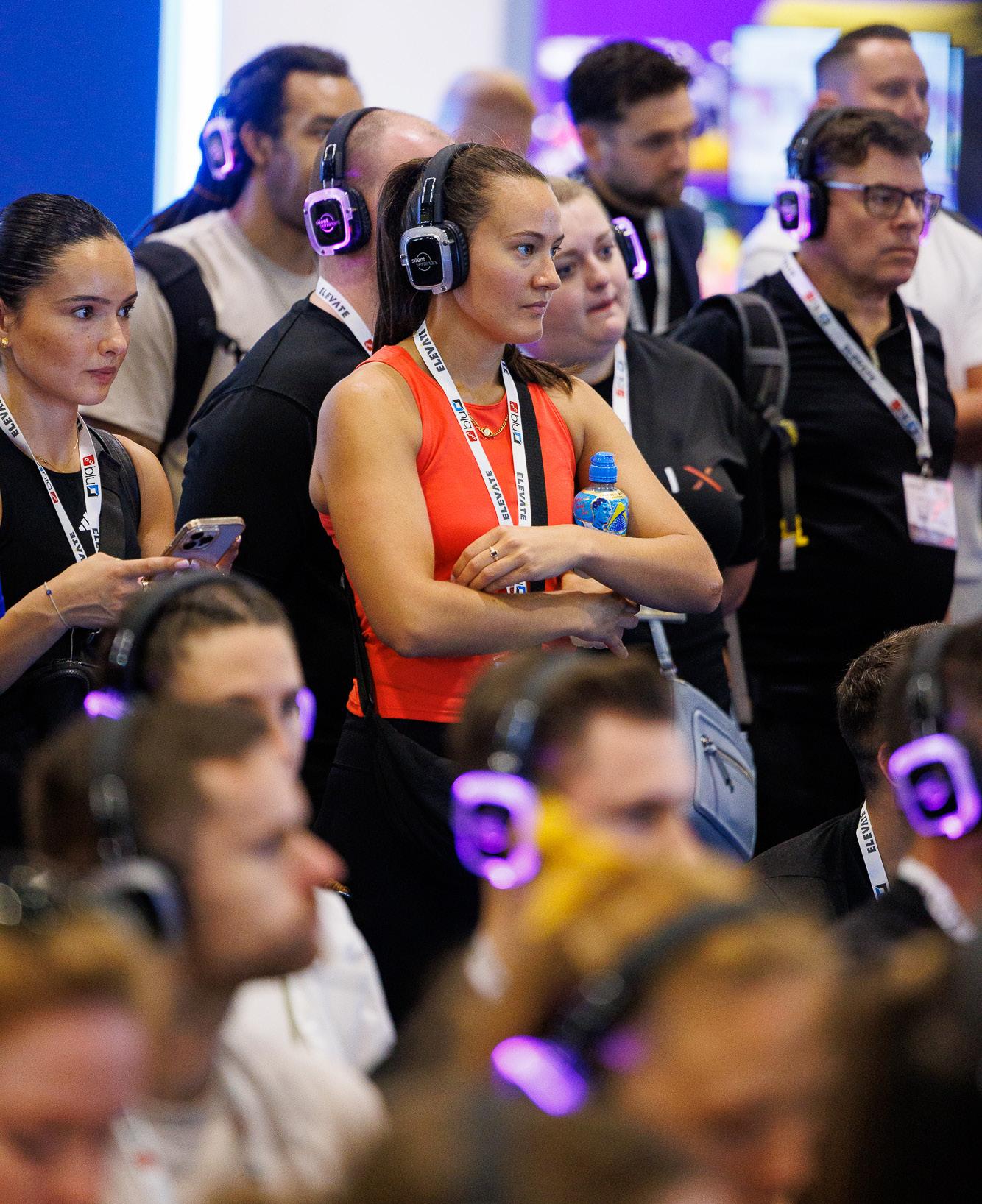
Elevate 2025 was another reminder of why I love this industry. Great people, great energy and great ideas. It was a joy to get out there, catch up with familiar faces and introduce some of the innovations our clients can look forward to over the next 12 months.
Lindsay Purcell-Myatt, Business Development Manager, Taylor Made Designs











































Alongside the theatres, the exhibition floor showcased the sector’s breadth and ambition. A diverse mix of exhibitors brought fresh thinking and product innovation to life, from advanced technology and recovery tools to inclusive equipment and performance solutions. Many stands were immersive, engaging and designed to draw in visitors with stand-out demos, activations and expert insight. The Future Fit Education Partner Lounge was a consistent hub of energy throughout the two days, packed with meaningful conversations, industry connections and collaboration. It embodied Elevate’s commitment to education and partnership, offering a dedicated space for learning and networking at the heart of the show. One of the keynotes this year was an “in conversation” session between Swim England CEO Andy Salmon and the Chair of the influential Culture, Media and Sport Select Committee and former DCMS minister, Dame Caroline Dinenage MP.
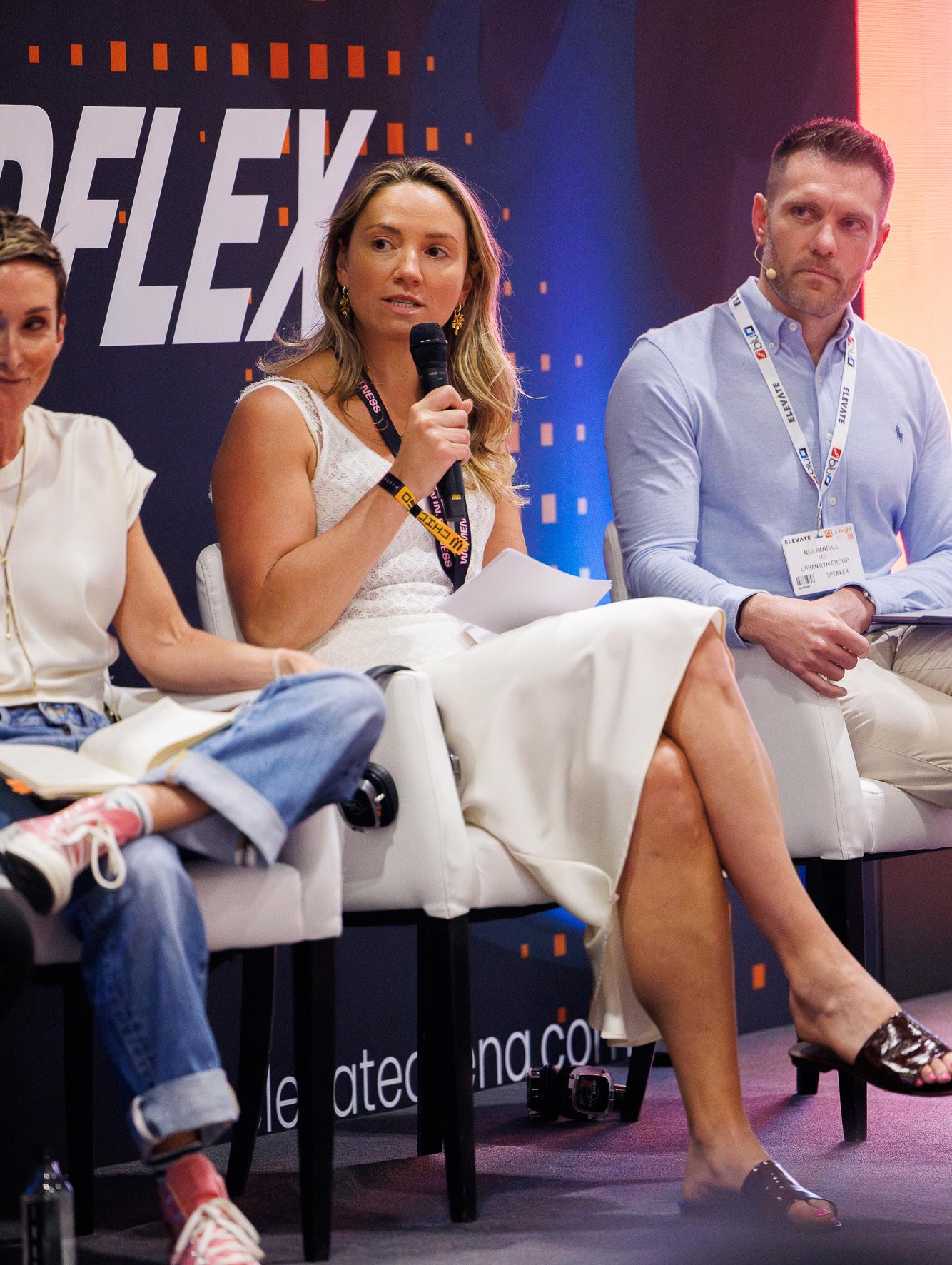
For us, Elevate is a great way to connect with many industry friends, colleagues and partners to show our “why” as an industry. Which is to help businesses become more successful and inspire more people to fall in love with fitness.
Blake Fletcher, Country Manager, UK & Ireland, iFIT & Freemotion Fitness
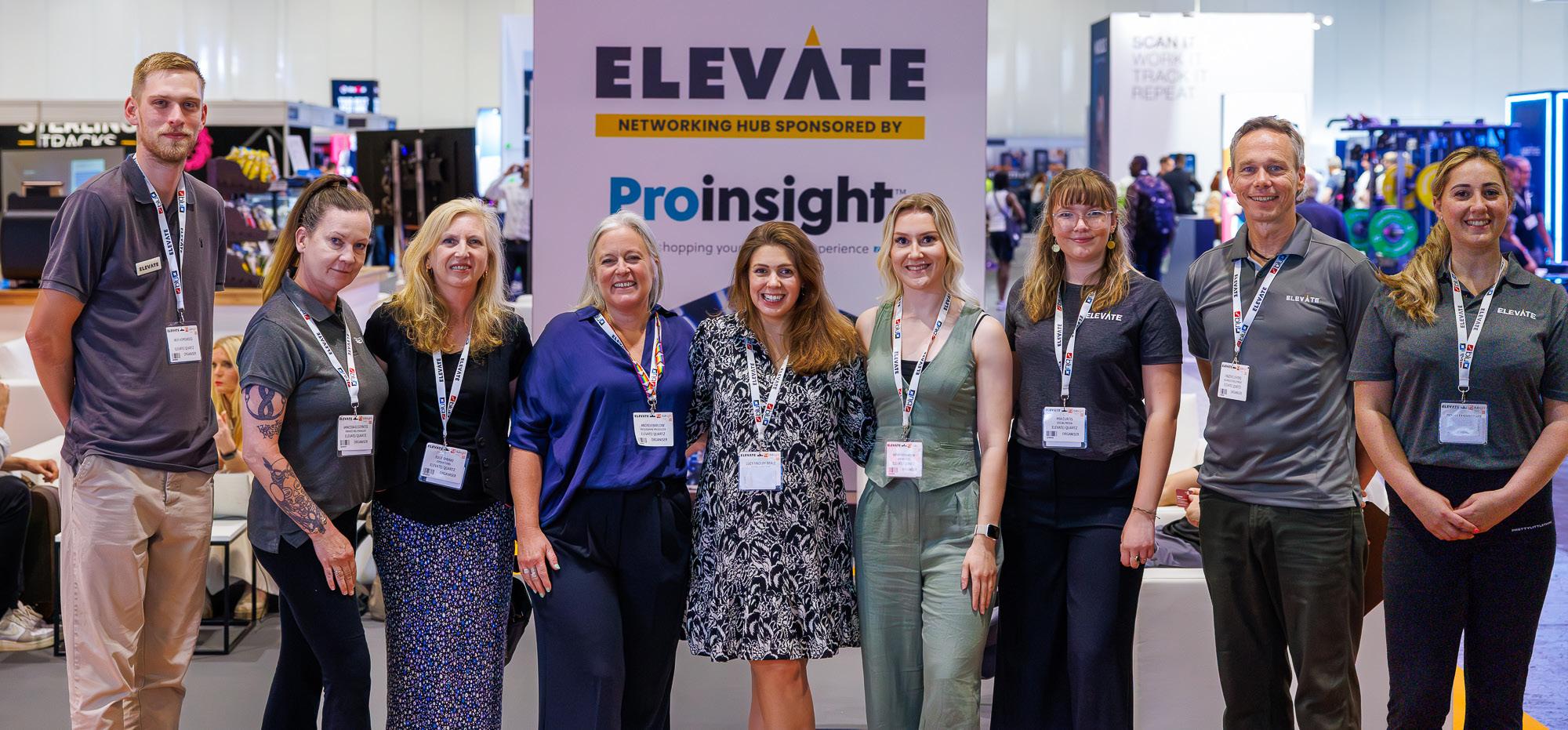







The discussion focused on how sport can shape healthier communities and improve lives, while it also highlighted some of the pressing challenges facing aquatics and a review of the government’s approach to sport and physical activity one year in.
“Synchronisation” was a key theme, in terms of the need to link government departments when it comes to policy-decision and setting strategies for getting people more active. “We need to get the departments in the same room,” Dame Caroline said. She also encouraged the physical activity sector to further work on forming a united front and a clear message. “Every sector has asked, or is still asking, for a VAT cut,” she explained. “You might want to find something else to campaign for. Ideally, you want to be selling a solution with societal benefits.”
Next year’s event will mark a decade of influence and organisers are already planning new features and expanded offerings to reflect the industry’s continued growth and evolving priorities.
According to Findlay-Beale, demand for next year’s landmark edition is already surging. “More than 60% of floor space for Elevate 2026 already reserved,” she says. “The strong early uptake reflects both the success of Elevate 2025 and the industry’s appetite to be part of the event’s special 10th anniversary celebrations.”
Two epic days at Elevate – packed with energy, inspiration, and next-level fitness moments. Our team had an incredible time connecting with amazing customers and showcasing the latest in EGYM innovation. The energy was electric. The people are truly inspiring. And the memories? Unforgettable.
Steve Barton, Country Director, EGYM
















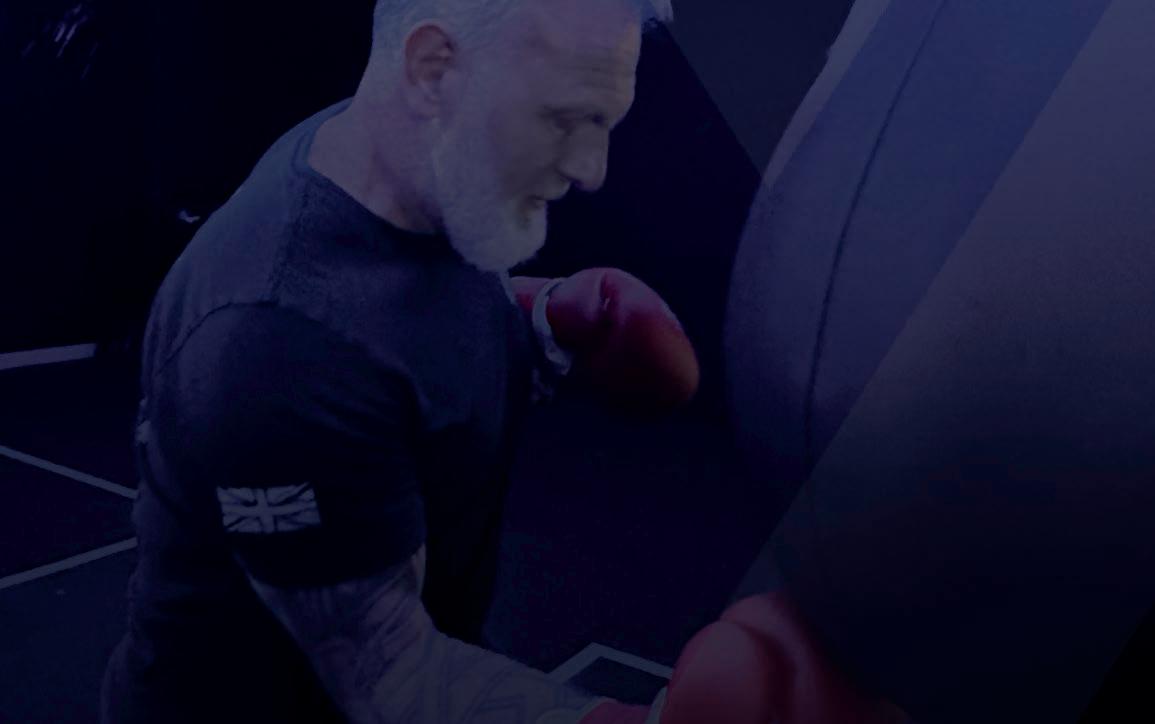










De��ning
and upholding standards are important for any industry or line of business. But when budgets are tight, is there a danger that “quality marks” that need to be paid for are placed on the “nice to have” list?
The leisure industry is rich in quality marks, from Sport England’s Quest and ukactive’s newly launched The Active Standard (TAS) to Swim England’s Learn to Swim and Right Direction’s Exercise Referral Standard and Tackling Inequalities Standard. But what purpose do they serve? And are they worth the effort? It’s a question operators around the country are considering when budgets are cut and utility bills have skyrocketed.
Standard bearers
Right Directions, the sector’s health and safety and quality management expert, manages the accreditation

Without that annual check in, it’s easy to lose focus on being proactive around continuous improvement
of all these awards on behalf of its industry partners. Managing Director, Caroline Constantine, explains why they’re important and how, by regularly assessing and enhancing services in line with industry best practices, they can help operators to innovate and grow.
“A belief that internal processes are sufficient, along with perceived cost and resource implications, a fear of scrutiny and a lack of awareness of the benefits, can make prioritising external accreditations an easy cull when you’re in the thick of managing a leisure centre and an already overstretched budget,” she says. “However, without that annual check in, it’s easy to lose focus on being proactive around continuous improvement. The end result is that customer satisfaction declines and members start to leave.
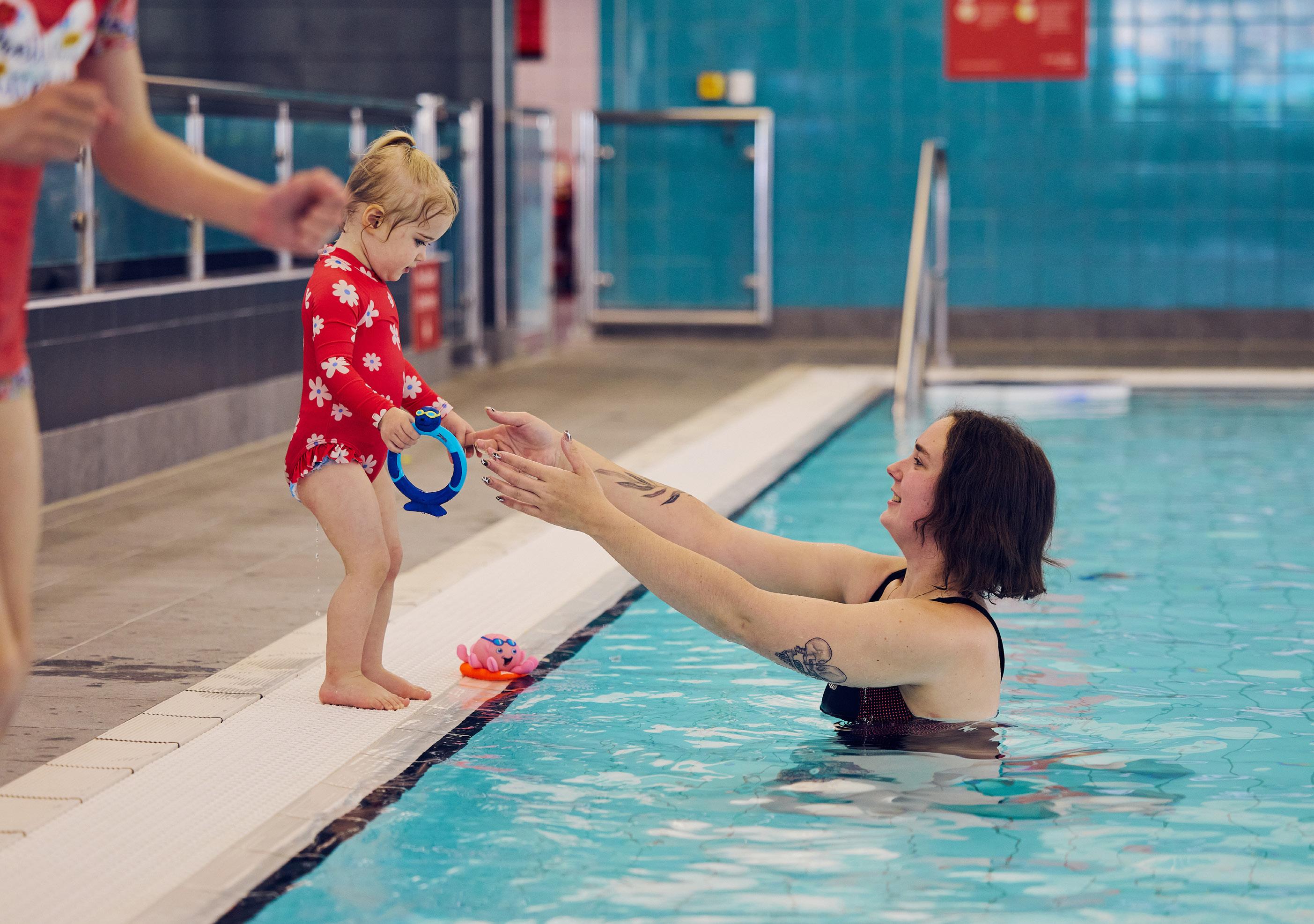
“We know ourselves as a business that things easily slip when you’re caught up in day-to-day operations. That’s why we commit to number of external accreditations, including ISO 45001, ISO 14001 and ISO 9001. Knowing we regularly need to produce proof of our policies and procedures, operational effectiveness and service delivery standards is enough to ensure we remain proactive and on top of documenting evidence across the key areas as we go along. It also means there’s no last minute rush to collate everything and put any missed plans in place just before assessment day.
“As with leisure-specific standards, these accreditations help to enhance operational efficiency and best practice and demonstrate our business’s commitment to quality and continuous improvement, which in turn builds trust and credibility with stakeholders, helping us to stay competitive.”

Awarding excellence in leisure Leisure industry accreditations act as recognition from key stakeholders, including Sport England and other governing bodies, that operators are adhering to set standards embracing safety, inclusivity, training and operational excellence, enhancing customer confidence through independent verification.
Day-to-day this encompasses regular staff training, policy updates, monitoring compliance and customer engagement - actions that should already be taking place, but may fall by the wayside if not regularly checked.
Many of the accreditations involve an in-depth independent assessment by industry experts, which includes site visits, a review of documentation, interviews with members of the team and performance evaluations, as well as mystery visits, via online, email, telephone, social media and in-person check ins, to challenge operational processes. This encourages operators to stay proactive year-round and ensure readiness for the formal evaluations. Regular reviews also support organisations in adapting to fit evolving best practices, with a focus on measurable outcomes, not just compliance.
There are five well-known and respected recognition marks in the physical activity sector.
Quest - established more than 20 years ago, Sport England’s Quest measures how well a facility is operating and how effective organisations are across a range of topics, to help deliver greater impact and social outcomes.
The Active Standard (TAS) - developed by ukactive in partnership with leading standards professionals and organisations across the UK and Europe, and now compulsory for ukactive member operators, the new mark of excellence is designed to demonstrate operators’ commitment to quality, safety and inclusivity.
The following awards can be carried out standalone or as part of the Quest assessment:
Learn to Swim - Swim England’s scheme assesses key business areas to recognise excellence, and acts as a mini business plan, helping operators to improve their lessons programme and offer a consistent pathway with clear progression goals to keep customers engaged.
Exercise Referral Standard (ERS) - developed by Right Directions in partnership with Suffolk Public Health to reassure GPs and health professionals that they can refer in the knowledge accredited facilities are successfully delivering programmes that have been rigorously tested using ‘real-world’ criteria.
Tackling Inequalities in Leisure Standard - replacing the Inclusive Fitness Initiative (IFI) back in 2022, accredited sites are recognised for their commitment to making sport and exercise accessible to everyone.
One of the operators to whom the Quest accreditation process has proved extremely valuable is Magna Vitae Leisure Trust. Since it started the process in 2016, it has offered a structured and comprehensive framework for continuous improvement.
Executive Director, James Brindle says: “Through Quest, Magna Vitae has been able to regularly assess and enhance its services, ensuring they meet high industry standards and exceed customer expectations. The accreditation process has allowed us to effectively benchmark our performance against best practices, identify areas for growth, and implement targeted improvements. This has not only strengthened operational efficiency but also enhanced staff engagement and development, fostering a culture of excellence and accountability within the organisation. The external validation provided by Quest also helps build trust with the local community and stakeholders.”

The accreditation process has allowed us to e ectively benchmark our performance against best practices
Hallmark of excellence
Sarah Lobo is Head of External Accreditations at Right Directions. She says: “External accreditations are a hallmark of excellence. They show customers that your centre meets nationally recognised standards for safety, service and programming. By achieving these accreditations, you signal to your community that quality is at the heart of everything you do, protecting both your customers and your reputation.
“People want to feel confident when they choose a leisure centre. Promoting the fact you have accreditations from trusted organisations like Sport England and Swim England reassures them that your facility is professional, safe and focused on their wellbeing.”



Constantine believes the accreditations help centres to stand out in a crowded field where they are competing with private clubs for a share of the market. She says: “They’re a visible sign of your commitment to excellence - a powerful marketing tool - making your facility the go-to choice for individuals, families and organisations seeking high-quality services. By demonstrating you are delivering the best possible Learn to Swim experience for the local community, for instance, Swim England’s accreditation helps schools to grow and ultimately earn more income.”
Ian Cotton, Group Aquatic & Activity Manager at Everyone Active agrees: “Independent verification of our standard processes and procedures through the Swim England accreditation is an important element of us maintaining a high-quality scheme. Swim lessons are a key part of our business, and holding the National Governing Body accreditation endorses the great work undertaken by our swim managers and swim teachers, and helps to raise the profile of the Learn to Swim programme offer at facilities.”
The quality marks also give an added air of authority to grant applications, as many funding bodies, local councils and corporate sponsors favour accredited
centres that can demonstrate accountability and deliver measurable results, opening the door to greater funding opportunities and strategic partnerships.
“Unlike simple self-assessments, these industryrecognised accreditations undergo rigorous evaluation to ensure they meet sector expectations and funding requirements,” notes Lobo, keen to highlight they’re far more than just tick box exercises. “Operators must actively demonstrate their commitment to continuous improvement, ensuring they meet the scrutiny of funding bodies and regulatory organisations.
“The process can also highlight gaps in knowledge, skills or compliance areas, helping businesses to identify areas for growth and enhanced staff competencies. They act as a reminder to invest in CPDs, specialist courses and certifications, as well as internal coaching and mentoring. It’s proven that access to training and professional development opportunities for staff directly leads to improved service delivery and operational excellence.”
● For further information on all the industry accreditations and courses on offer via Right Directions visit: https://rightdirections.co.uk/

